 27/01/2011 21:33 27/01/2011 21:33 |
|
| | | OFFLINE | | Post: 22.018
Post: 4.646 | Registrato il: 28/08/2005
Registrato il: 20/01/2009 | Administratore | Utente Master | |
|


 See preceding page for earlier entries today, 1/27/11.
See preceding page for earlier entries today, 1/27/11.

 Remembering the Holocaust:
Remembering the Holocaust:
A path never to be repeated
Translated from the 1/28/11 issue of

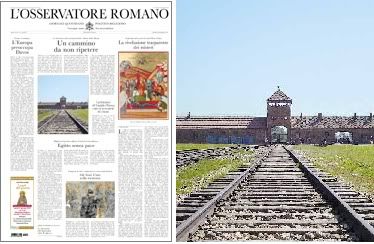 The OR considered this item important enough to be the lead article in tomorrow's issue. Photo shows the entrance to the Auschwitz lager, with the infamouis railroad tracks that brought trainloads of Jews and other 'undesirables' to the camp.
The OR considered this item important enough to be the lead article in tomorrow's issue. Photo shows the entrance to the Auschwitz lager, with the infamouis railroad tracks that brought trainloads of Jews and other 'undesirables' to the camp.
WARSAW, Jan, 27 - As in past years, the principal ceremony on International Holocaust Remembrance Day took place today in the former Nazi concentration camp of Auschwitz-Birkenau in Poland.
For the first time, both the presidents of Poland and Germany - Bronislaw Komorwski and Christian Wulff, respectively - took part in the rite together.
Both warned that the factors that led to the Shoah are still a daily danger in the world.
"After the Second World War, not a day has passed in the world without a war somewhere," German President Wulff said. "Everyay we are witness to massacres and genocide with an ethnic, racial, religious or linguistic origin".
"We have the duty to ask ourselves in this place how to protect the world against crimes of hatred and disrespect of human rights," said the Polish President.
In his message for this year's remembrance of the Shoah victims, UN Secretary-General Ban Ki-moon paid tribute to the women victims. "Mothers and daughters, grandmothers, sisters, aunts saw their lives irrevocably changed, their families torn apart, and their traditions destroyed. But despite the horible acts of discrimination, privation and cruelty, they constantly found ways to fight their persecutors".
In Italy, President Giorgio Napolitano referred to national responsibilities in fostering hostility such as that which led to the Shoah. "Other than blind persecutory racism, nothing could have motivated the expulsion by the Fascists of Jews and their communities from the civilian consortium of Italy".
Warning against factional and sectarian hatreds today, Napolitano urged vigilance because "prompt responses are called for wherever the seed of such hostility manifests itself in whatever form".
The Italian service of Vatican Radio has compiled statements made by Benedict XVI about the Holocaust since he became Pope.
|
| |
|
| |
 27/01/2011 22:40 27/01/2011 22:40 |
|
| | | OFFLINE | | Post: 22.019
Post: 4.647 | Registrato il: 28/08/2005
Registrato il: 20/01/2009 | Administratore | Utente Master | |
|
 Unless you want to read selective accounts of the Holy Father's catechesis on Joan of Arc yesterday - picked up by the secular media because he held her out as 'a model for politicians' - or retreads of how MSM interprets the Pope's message for World Social Communications Day in 2011 as a blessing for social networking, a warning against Catholic bloggers to be more tempErate, or a reminder that the virtual world should not replace reality, then the only 'news' today about the Pope are calendar items - one looking ahead to World Youth Day in Madrid next August, the other to the first 'Court of the Gentiles' initative to get under way at UNESCO headquarters in Paris in March.
Unless you want to read selective accounts of the Holy Father's catechesis on Joan of Arc yesterday - picked up by the secular media because he held her out as 'a model for politicians' - or retreads of how MSM interprets the Pope's message for World Social Communications Day in 2011 as a blessing for social networking, a warning against Catholic bloggers to be more tempErate, or a reminder that the virtual world should not replace reality, then the only 'news' today about the Pope are calendar items - one looking ahead to World Youth Day in Madrid next August, the other to the first 'Court of the Gentiles' initative to get under way at UNESCO headquarters in Paris in March.
 Pope to make third visit
Pope to make third visit
to Spain in August

MADRID, Jan. 27 A(FP) - Pope Benedict XVI will make his third visit to Spain in August to preside over World Youth Day festivities because he believes the nation “needs a deeper evangelisation”, a Spanish Church official said yesterday.
The 83-year-old Pope railed against social reforms introduced by Spain’s socialist government such as same-sex marriage and easier access to abortion during his two previous visits.
The visit to Madrid, between August 18 and 21, will make Spain the country that he has travelled to the most since becoming Pontiff.
“I think he feels the visit will suit us very well, he feels Spain needs a deeper evangelisation,” World Youth Day director of ceremonies Javier Cremades said at a news conference when asked why the Pope was visiting Spain again. [First of all, he committed to the WYD event in 2008, when he announced it in Sydney. Both his first two visits to Spain as Pope were similarly occasion-based: to close the Fifth World Encounter of Families in 2006, and to mark the Holy Year of St aJames in Compostela and consecrate teh Baslica of La Sagrada Familia in Barcelona, last November.]
The World Youth Day festival was the brainchild of the late Pope John Paul II who thought it could help revitalise faith among the world’s young Catholics.
The event features concerts and dances alongside masses and prayer meetings.
Church officials expect tens of thousands of youths from outside Spain will attend the festival.
The Pope will lead a Way of the Cross procession on August 19 through the streets of the Spanish capital involving youth from 15 nations “who will reflect the problems and difficulties faced by young people around the world,” said Mr Cremades.
He will celebrate a two-hour Mass at an airfield just outside Madrid that Catholic Church officials expect will draw some two million pilgrims on the last day of his visit.
Before leaving Spain the Pope will announce the location for the next World Youth Day festival. It was last held in Sydney, in 2008.
Pope Benedict visited Spain in 2006, a year after he was elected Pontiff, for a Church meeting on families in the eastern city of Valencia.
He returned in November 2010 for a two-day visit that included a stop in Barcelona to consecrate the Sagrada Familia basilica, the masterpiece of architect Antoni Gaudi.
The following story rehashes a ROME REPORTS article posted on page 175 of this thread last January 5 and adds a few details.
 Illustrations from a scale model of the Temple found in the Jewish Museum in Jerusalem.
Illustrations from a scale model of the Temple found in the Jewish Museum in Jerusalem.
 Vatican to launch dialogue
Vatican to launch dialogue
with non-believers in March
By Alan Holdren, Rome Correspondent

Vatican City, Jan 26, 2011 (CNA/EWTN News).- Dialogue between the Vatican, agnostics and atheists will take place in a new arena as of this spring.
The "Courtyard of the Gentiles" project, brainchild of the Pontifical Council for Culture and its president Cardinal Gianfranco Ravasi, will be officially presented Mar. 24-25 in Paris, France. ][No, the 'court of the Gentiles' idea itself was BenedictXVI's, presented in his address to the Roman Curia in December 2009. Ravasi's dicastery is in charge of implementing it.]
Cardinal Ravasi first unveiled his plans for the Paris inauguration of the "Courtyard" last year, but further details were released in a statement from the council on Jan. 25.
The Vatican's culture department plans for it to be "a new permanent Vatican structure to promote dialogue and encounter between believers and non-believers."
The inauguration in Paris will involve a series of events over two days.
Presentations based on the theme “religion, enlightenment, common reason" will be delivered at the headquarters of UNESCO, the United Nations Educational and Scientific Organization, Sorbonne University and the Institut de France.
A roundtable discussion at the College des Bernardins will conclude the events on March 25. Festivities including music, plays, and a light show will follow outside the Cathedral of Notre Dame.
During the celebration, themed “Into the Courtyard of the Unknown,” the cathedral will be open for prayer and meditation.
As reported in Italy's La Repubblica last May, Cardinal Ravasi explained that the "project" would begin with the broad base of discussing "a comprehensive vision of man."
It will not shy away from themes such as abortion, homosexuality and pedophilia, he said, but these subjects would be addressed during dialogue "in due time.
[Modificato da TERESA BENEDETTA 27/01/2011 22:44] |
| |
 28/01/2011 02:57 28/01/2011 02:57 |
|
| | | OFFLINE | | Post: 22.020
Post: 4.648 | Registrato il: 28/08/2005
Registrato il: 20/01/2009 | Administratore | Utente Master | |
|
 The following event is listed in the Liturgical Calendar for the Pope released the other day by the Vatican and I have picked up a couple of details about it elsewhere. One thing led to another, and I have a pretext to recall how Cardinal Ratzinger ended MILESTONES...
Benedict XVI to consecrate
The following event is listed in the Liturgical Calendar for the Pope released the other day by the Vatican and I have picked up a couple of details about it elsewhere. One thing led to another, and I have a pretext to recall how Cardinal Ratzinger ended MILESTONES...
Benedict XVI to consecrate
a Rome parish to St. Corbinian
On March 20, second Sunday of Lent, Benedict XVI will dedicate the new parish of San Corbiniano in Infernetto, a working class neighborhood in Rome's southern suburbs. The Diocese of Munich contributed to construction of the parish church.
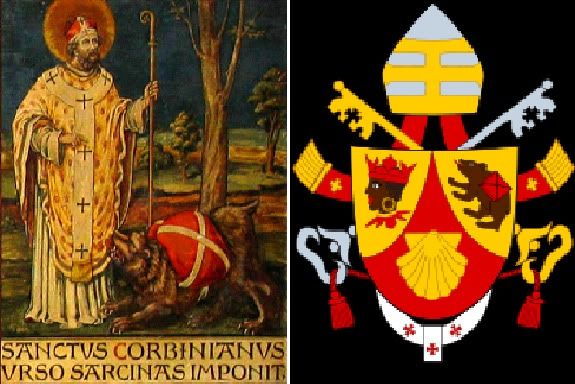
St. Corbinian is, of course, the 8th century bishop who preceded St. Boniface in evangelizing the Germans and who founded the diocese of Munich and Freising. His symbol was the saddled bear.
Legend says that when Corbinian travelled to Rome before he became bishop, a bear killed his horse, so he saddled the bear and let him carry his load to Rome, after which he released the bear. When Joseph Ratzinger was named Archbishop of Munich-Freising, he adapted Corbinian's bear into his coat of arms as cardinal, and eventually as Pope.
While we often quote Benedict XVI's reference to himself as 'a simple worker in the vineyard of the Lord' from his first message to the world as Pope, the image he used of himself in the poignant ending to his memoir MILESTONES was that of a farm animal, a beast of burden, God's donkey. It is worthwile recalling this ending.
Describing his coat of arms as Archbishop of Munich-Freising, he refers first to the image of the crowned Moor whioch has been on the coat of arms of the Bishops of Freising for over a thousand years.
"No one is quite sure what it means. For me it is a sign of the universality of the Church," he writes, "which knows no distinction of races or classes, since all of us 'are one' in Christ (Gal 3:28)". [Strange that this detail has escaped the Pope's Muslim detractors!]
He then says that he added for himself two symbols: First, the scallop shell as a sign of man's pilgrimage on earth, and because it reminded him of the legent of Augustine pondering the mystery of the Trinity and likening it to a boy by the seaside trying to pour the watr of the sea into a hole in the sand.
"The hole can no more contain the waters of the ocean than your intellect can comprehend the mystery of God. Thus, for me, the shell points to my great master Augustine, to my own theological work, and to the rgeatness of the mystery that extends farther than all our knowledge".
The second sumbol was Corbinian's bear.
The bear weighed down with the saint's burden reminded me of one of St. Augustine's meditations on the Psalms. In verses 22 and 23 of Psalm 72 (73), he saw expressed both the burden adn hope of his life...
What Augustine writes in this connection became for me a portrayal of my own destiny... (Meditating on the psalm), he sees an image of himself under the burden of his episcopal service. "A draft animal amI before you, for you, and this is precisely how I abide with you".
He had chosen the life of a scholar, but God had chosen to make him into a 'draft animal' - a good, sturdy ox to pull God's cart in this world... ust as the draft animal is closest to the farmer, doing his work for him, so is Augustine closest to God precisely through such humble service, completely within God's hand, completely his instrucment. He could not be closer to his Lord, or be more important to him.
The laden bear that took the place of St. Corbinian's donkey, the bear that became a donkey against its will. Is this not an image of what I should do and what I am? "A be3ast of burden have I become for you, and this is just the way for me to remain wholly yours and always abide with you"...
In the meantime, I have carried my load to Rome and have now been wandering the streets of the Eternal City for a long time. I do not know when I will be released, but one thing I do know: that the exclamation applies to me too: "I have become your donkey, and in this way I am with you".
No matter how many times I have read this ending, with its unseen predestination, it never fails to bring on the tears.
|
| |
 28/01/2011 12:18 28/01/2011 12:18 |
|
| | | OFFLINE | | Post: 22.021
Post: 4.649 | Registrato il: 28/08/2005
Registrato il: 20/01/2009 | Administratore | Utente Master | |
|

 From the diocesan information service of Rome, a report on the series of seminars on Benedict XVI's three great secular discourses.
Faith and reason
From the diocesan information service of Rome, a report on the series of seminars on Benedict XVI's three great secular discourses.
Faith and reason
in the Regensburg lecture
by Daniele Piccini
Translated from

The dialectic between faith and reason, analyzed by Pope Benedict XVI in his address at the University of Regensburg in September 2006, was the subject of the first of three meetings arranged by the diocesan office for pastoral ministry in universities, dedicated to a thelogical reading of the Pope's three great secular discourses - Regensburg 2006, Paris 2008, and London 2010 - at the Lateran Apostolic Palace.
The rector of the Pontifical Lateran University, Mons. Enrico Dal Colvolo, spoke of "The religious question among pagans and Christians", showing how the latter availed of philosophical tools to confront the discourse about the divine which the religion of the pagans still considered to have a mythical basis:
"The Christian faith made a clear choice against the gods of religion for the God of philosophy, that is to say, against the myth of habit, for the truth of being", Dal Covolo said.
"From its origins, Christianity joined the question of God with the truth of being, in an inexhaustible dialog between reason and faith, in which reason consistently makes itself available to mystery and thus 'widens iself'."
Francesco D’Agostino, professor of the philosophy of law at the University of Rome in Tor Vergata, discussed the Pope's admonition to science not to lose its way in reductionist scientism.
Benedict XVI's warning to science to "defend itself from itself" was not to refashion scientific methodology: "Scientists should not take a step backward. Science is true but insufficient in the face of reality. The enlargement of 'vision' in its metaphysical, existential and esthetic aspects has ethical repercussions. It is right to obey the truth of things. But not as slaves. Rather, as children obeying the father. We cannot know things that we do not love".
Giorgio Israel, professor of mathematics at La Sapienza University, demonstrated the intimate solidarity between Greek rationalism and the three monotheistic religions, representes culturally adn historically by Maimonides, St. Thomas Aquinas, and Averroes. A union that lasted to the modern era.
"Galileo's affirmation that the world is mathematical," said Israel, "was truly the result of the theological solidality between religion and science. However, Galileo's principle was extremized and misunderstood to the point that it was made to mean that not only the physical world but every aspect of the world was mathematical, thereby inaugurating that positivistic reductionism and that 'self-decreed limitation of reason' denounced by the Pope".
The best defense against relativism, Israel concluded, consists in admitting "a rationality and an idea of objectivity that is wider than that suggested by scientfic canons behind which there is no room for the idea of God".
Cardinal Agostino Vallini, the Pope's Vicar for Rome, expressed the Pope's 'satisfaction' in being told about these philosophical discussions.
He recalled how to the Christian martyrs, dying, had defined the sphere of the individual conscience against the impositions of the pagan religio".
The second encounter, on the Pope'e address at the College des Bernardins in paris in September 2008 will be held on January 27, and dedicated to "European culture, its origin and prospects".
I have so far found Prof. Israel's lecture online and will post as soon as translated. The second of the seminars - focused on the College des Bernardins discourse, took place last night. And excerpts from one of the speakers are published in today's issue of the OR.
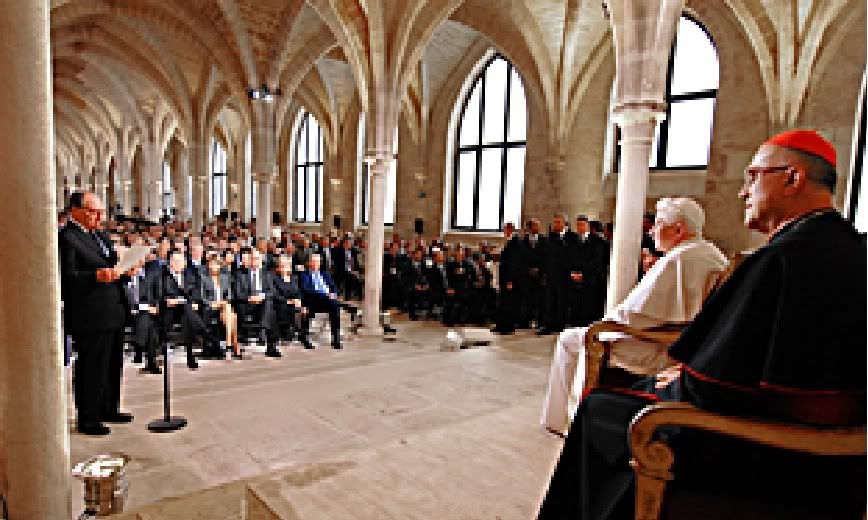 'The monk in us':
'The monk in us':
Reflections on Benedict XVI's 'lectio magistralis'
at the College des Bernardins, Paris
by Giuseppe della Torre
Translated from the 1/28/11 issue of

That Christianity gave a fundamental contribution to shape the European identity, and therefore, to its culture, is an undeniable historical fact which can ignored or downright rejected - as it has often lately - only from partisan ideological poisitions
Between late antiquity and the Middle Ages, there were other operative factors that contributed to the European identity: classical Greco-Roman culture, along with Germanic, Celtiv and Salvic cultures, were also placed into the crucible of Christianity.
Religion forged the culture of the continent, the basis - at least for western Europe - of its very political unity in the Middle Ages. And culture has its language, its paradigms, its values: it modulates sensibilities and promotes intellectual and material processes, Such processes take place over a long time but their roots are profound.
Even models change. For example, it has been rightly observed by Jacques Le Goff that "medieval Europe built new cultural models other than the heroic warrior and the orator of antiquity. The first was an expression of the new religion, Christianity. It is the model of the sacred".
He adds: "Even when the Middle Ages receded into the past and religious ideals were weakening, the sacred would remain present among Europeans, present in art and in literature, present in the idea of human perfection (there would be lay saints), present in the calendar of annual feasts and the very names that Europeans bear even today".
In his fascinating lecture at the College des Bernardins in Paris on Sept. 12, 2008, Benedict XVI recalled another great model that Christianity had introduced to European culture in the act of forging it - and that was monasticism.
It was a monasticism different from previous experiences, such as the late Judaic cult of the Essenes with its dualism between God and Belial, light and shadows; nor like the Hindu and Buddhist models; even unlike Oriental Christian monasticism such as that of St. Anthony Abbot, father of hermits, with its extreme forms of asceticism; or of Pacomius, father of cenobites, which originated monastic living in community.
Benedict XVI referred to the new monasticism which in its choice of an extraordinary lifestyle did not escape from the world but entered it and transformed it profoundly.
As the Pope notes at the start of his reflection, this monastic life was characterized by a search: "They were in search of God. From secondary things, they wished to pass on to the essential, only to what was truly important and reliable. It is said that their orientation was 'eschatological'. But this is not to be understood in a chronological sense, as if they looked towards the end of the world or their own death. It had an existential sense: Behind transitory things, they sought the definitive: Quarere Deum - to look for God".
The essential and characteristic component of Christian monasticism is contained in the well-known principle of 'ora et labora' - prayer and work - which states its orientation in words that belong to the search for those truths that precede the ultimate Truth: Work, which is specific to the human condition, involving man in the work of God's continuing creation of the world.
Monasticism embodied in an exemplary manner the new attitude of Christianity towards the world. It was clearly different from the pre-Christian and non-Christian experiences to which any similarities are only superficial.
It set itself apart, above all, from the idea of the monastic life as a peradigm for escaping the world, to which, on a contrary, religious man believes himself obligated in a salvific sense. The monastic choice was not a transcendence of the worldly dimension, not an escape from created reality, not an annulment of the individual in a disembodied mysticism, much less a dualistic opposition of body and soul. And nNot a tension, as in the Platonic ideal, towards liberating the soul from its bodily prison.
St. Benedict's 'ora et labora' has constituted, through the centuries, a a strong antidote to the temptations which preiodically assail the Christian: such as disembodied spiritualism, or a nascent Manichaeism - arising from a misinterpretation of Augustine - which sees the world as an evil to flee from; nor an apocalyptic eschatology which induces to lack of commitment, to resignation or to terror; or to a rejection of social and political commitment in which States are perceived only as isntitutions of 'grand larceny'.
But Western monasticism also distinguished itself from analogous experiences on the opposite front - that of a sub-mundane eschatology which sees the annihilation of the self in the ocean of nature.
The Benedictine 'ora et labora' later constituted a strong historical antidote to hte nascent resurgent temptations of misreading Thomas Aquinas - seeing a kingdom of God that is realizable and that should be realized here and now, of a merely political function for the evangelical message, a perspective - that can be shared but not as the exclusive, much less the ultimate one - of a revolution that would transform social and political structures to be more just, more 'social', more human. In short, turning the well-known Augustinian image on its head by seeking to shape the City of God on the paradigm of the earthly city.
As Benedict XVI observed, "Together with the culture of the word, monasticism was a culture of work without which the development of Europe, its ethos and its formation in the world would be unthinkable".
He adds, "But this ethos must include the will to ensure that work -and the determination of history by man - should be a collaboration with the Creator, taking its measure from him. Where this measure lacks and man elevates himself to a deiform creator, then the formation of the world can easily be transformed into its destruction".
Thus, in the Bernardins lecture, there was a strong provocaiton to us Europeans: The direct challenge was to let 'the monk in us' grow. The reference here is obviously not to the lifestyle among the many that are possible for the Christian faithful. The reference is to a spirit, an idea of experience, an intellectual course, a methodology of research.
As such, the underlying invitation in the Paris lecture to let 'the monk in us' grow, was addressed not just to believers, but to all Europeans - as Benedetto Croce said, we cannot say we are not Christians - as a probable experience, one that can be tried, if only as an intellectual search that is open to the discovery of God: quaerere Deum.
In this sense, one fully sees the invitation that Benedict XVI has made on many other occasions - to develop personal and social experiences in the perspective of etsi D=eus daretur, as if God exists.
Central to the monastic experience, which is a paradigm that can be imitated, is the word, in the sense that "the desire for God includes a love for letters, a love for the word to be penetrated in all its dimensions".
And since, "in the Biblical Word, God comes toward us as we go towards him, one must learn to penetrate the secret of language, to understand its structure and its form of expression".
Speaking to men, God expresses himself in human words: so one must refine the intellectual and cultural tools to grasp the Word of God within and behind human language.
Benedict XVI noted, "the monastery served eruditio, the formation and erudition of man - a formation with the ultimate objective that man may learn to serve God. But this involves the formation of reason - erudition on the basis of which man learns to perceive the Word in the midst of words".
But what else can monasticism tell us? Today, in our technologically refined society and its emerging disenchantment with secularization, can monasticism constitute for all - believers as well as those seeking to believe - a model that can still be proposed? Can it offer a reason for hope and a remedy for skepticism, resignation and lack of commitment?
Through the paradigm of Christian monasticism, Benedict XVI indicates a possible path today, with all its differences from the past, but even with what is analogous, or better said, with what has always been, for everyone everywhere, the human condition.
It is a possible path for believers and non-believers, since it has to do with not mortifying intelligence and reason, but to stimulate them to grasp the internal structure of all creation, with its intrinsic laws inscribed by God the creator and master.
But the Pope warns against two dangers which can take us away from the proposed paradigm. The first is that of individualism, of arbitrary individual will - which subjectively does not take account of the natural relational structure characteristic of man, and objectively does not take account of human reason which, when purified, is able to know objective truth, just as individualism ignores and does without the link that comes from love.
The other danger is that of fundamentalism, a danger about which we are more aware and sensitive. But we recognize it primarily to the degree in which it represents an external threat - in the manifestations of cultural realities and religious experirnces that are alien to our traditions. For us today, fundamentalism coincides essentially with Islam.
In fact, even within our civilization as it has historically developed, in the modern drift represented by the process of secularization, in the face of the apparent triumph of tolerance as a virtue, as the affirmation of the relativistic idea that every position is equally worthy, one often encounters new forms of fundamentalist fanaticism.
In new configurations, alien idols have reappeared before which ritual worship is demanded with intransigence. [In short, all the hypocirsy and self-destructive stupidity of political correctness!]
Even this brings tension between relationships and freedom, which charatcerized monastic experience and profoundly shaped Western culture, expressed in the binomial 'intellect' and 'love'.
"It would be fatal," exhorts Benedict XVI, "if European culture today can understand freedom only as the total lack of connections, thus favoring fanaticism and arbitrariness inevitably" because these "do not constitute freedom but its destruction".
[Modificato da TERESA BENEDETTA 28/01/2011 14:43] |
| |
 28/01/2011 16:04 28/01/2011 16:04 |
|
| | | OFFLINE | | Post: 22.022
Post: 4.650 | Registrato il: 28/08/2005
Registrato il: 20/01/2009 | Administratore | Utente Master | |
|
 Friday, January 28, Third Week in Ordinary Time
Friday, January 28, Third Week in Ordinary Time
 Second from left, detail from Gozzoli's Triumph of St. Thomas,1471; and second from right, St. Thomas from a fresco by Fra Angelico, ca 1435.
ST. THOMAS AQUINAS (Tomasso d'Aquino] (Italy, 1225-1274)
Second from left, detail from Gozzoli's Triumph of St. Thomas,1471; and second from right, St. Thomas from a fresco by Fra Angelico, ca 1435.
ST. THOMAS AQUINAS (Tomasso d'Aquino] (Italy, 1225-1274)
Dominican , Philosopher-Theologian, Doctor of the Church (Doctor Angelicus)
Born the son of a count in a castle that still stands not far from Rome, Thomas was sent to the Benedictines at Monte Cassino at age 5. His parents expected him to grow up to become its abbot like his paternal uncle. But at 18, when studying in Naples, he was attracted to the Dominican Order. Two years followed during which his family 'imprisoned' him in the hope of dissuading him from joining the Dominicans. But eventually his mother helped him escape in a face-saving gesture, and he went on to Paris for further studies. Albertus Magnus was one of his teachers, and when he was sent to Germany, Thomas followed him to Cologne. In 1252, he returned to Paris where he was named master of theology at the university. In 1259, his order recalled him to Naples to set up a school, then went on to Rome in 1965 for the same purpose, at which time he began work on his masterpiece, the Summa Theologica. He returned to Paris in 1268-1272 for a second turn as master of theology at the university, after which he returned to Naples. During all this time, he wrote volume upon volume of what are considered to be the bedrock texts of scholastic theology. En route to the Second Council of Lyons in 1274, he struck his head on a tree and never fully recovered. A year before he died, he decided to stop writing, saying famously that "all I have written seems like so much straw compared to what has been revealed to me". He is a towering figure in the history of Western thought. Compared to what has been written about him as a thinker, not much is generally written about his spiritual life, but in many medieval images, he was portrayed as a mystic.
Readings for today's Mass: www.usccb.org/nab/readings/012811.shtml
OR today.
 Illustrations: Main gate to Auschwitz today; modern icon depicting the death of St. Ephrem the Syrian; and the Qa'aba in Mecca, Islam's holiest place.
The only papal news in this issue is the publication of the Holy Father's prayer intentions in 2012, but there is a report on a lecture commenting on Benedict XVI's address to the French world of culture in September 2008 (translated and posted above). The main story is the commemoration of International Holocaust Remembrance Day yesterday. Theologian Inos Biffi writes an essay on St. Ephrem the Syrian and another one on St. Thomas Aquinas, whose liturgical feast is marked on the same day. International news includes continuing protest demonstrations against President Mubarak in Egypt; severe winter weather in northeastern United States, and the federal deficit ballooning to 1.3 trillion dollars this year, or almost 10% of the US GDP; and the Pew Center report estimating there are 1.6 billion Muslims in the world today (compared to 1.2 billion Catholics - and more than 2 billion christians in general), projected to be 2.2 billion by 2030, as the Muslim birth rate, although declining, is twice that of the mon-Muslim world.
PAPAL EVENTS TODAY
Illustrations: Main gate to Auschwitz today; modern icon depicting the death of St. Ephrem the Syrian; and the Qa'aba in Mecca, Islam's holiest place.
The only papal news in this issue is the publication of the Holy Father's prayer intentions in 2012, but there is a report on a lecture commenting on Benedict XVI's address to the French world of culture in September 2008 (translated and posted above). The main story is the commemoration of International Holocaust Remembrance Day yesterday. Theologian Inos Biffi writes an essay on St. Ephrem the Syrian and another one on St. Thomas Aquinas, whose liturgical feast is marked on the same day. International news includes continuing protest demonstrations against President Mubarak in Egypt; severe winter weather in northeastern United States, and the federal deficit ballooning to 1.3 trillion dollars this year, or almost 10% of the US GDP; and the Pew Center report estimating there are 1.6 billion Muslims in the world today (compared to 1.2 billion Catholics - and more than 2 billion christians in general), projected to be 2.2 billion by 2030, as the Muslim birth rate, although declining, is twice that of the mon-Muslim world.
PAPAL EVENTS TODAY
The Holy Father met today with
- Mons. Antonio Maria Vegliò, President of the Pontifical Council for the Pastoral Care of Migrants and Itinerant Workers
- Mons. Zygmunt Zimowski, Emeritus Archbishop of Radom (Poland) and President of the Pontifical Council
for Pastoral Ministry to Healthcare Workers
- Mons. Faustino Sainz Muñoz, former Apostolic Nuncio to the United Kingdom, with members of his family
(Mons. Sainz was incapacitated by a severe stroke several weeks before the Pope's visit to the UK last year)
- H.E, Francis Martin-Xavier Campbell, Ambassador from Great Britain, and
- H.E. Suprapto Martosetomo, Ambassador from Indonesia - both on their farewell visit.
- Participants in the meeting of the Mixed International Commission for Theological Dialog between
the Catholic Church and the Eastern Orthodox Churches. Address in English.
 - The Executive Summary of the Pew report on a global overview of Islam may be found on
- The Executive Summary of the Pew report on a global overview of Islam may be found on
pewforum.org/The-Future-of-the-Global-Muslim-Population.aspx
- In today's Il Foglio, Paolo Rodari has a lengthy analysis of what may be involved in the Holy Father's impending choice for Archbishop of Milan to succeed Cardinal Tettamanzi, who is retiring in March aftr the two-year extension he requested of the Pope when he turned 75. Rodari says that, as usual, the Pope will listen to all sides pushing their respective candidate, but he will make up his mind alone, uninfluenced by partisan advocates. Three names have been prominently mentioned as the most likely candidates - Cardinal Gianfranco Ravasi, who is Milanese; Cardinal Angelo Scola, now Patriarch of Venice; and Mons. Pizzaballa, head of the Franciscan Custody of the Holy Land - but Rodari says there are equally compelling reasons why none of the three may be considered by Benedict XVI to be the right pastor at this time for the world's largest diocese.
[Modificato da TERESA BENEDETTA 28/01/2011 21:13] |
| |
 28/01/2011 16:39 28/01/2011 16:39 |
|
| | | OFFLINE | | Post: 22.023
Post: 4.651 | Registrato il: 28/08/2005
Registrato il: 20/01/2009 | Administratore | Utente Master | |
|
 Regardless of the circumstances surrounding the letter reported here, one imagines that this news item will give rise to the next media storm about the Pope, with advocates of doing away with priestly celibacy screaming 'GOTCHA!' gleefully....
In 1970, Joseph Ratzinger signed a petition
Regardless of the circumstances surrounding the letter reported here, one imagines that this news item will give rise to the next media storm about the Pope, with advocates of doing away with priestly celibacy screaming 'GOTCHA!' gleefully....
In 1970, Joseph Ratzinger signed a petition
by nine German theologians calling
for an examination of priestly celibacy
by Anna Arco

28 January 2011
As a young priest, Pope Benedict put his name to a document calling for the Church to seriously investigate the obligation to priestly celibacy.
Joseph Ratzinger was one of the signatories of a 1970 document calling for an examination of priestly celibacy which was signed by nine theologians.
The memorandum was drawn up in the face of a shortage of priests, and other signatories included Karl Rahner and the future cardinals Karl Lehmann and Walter Kasper.
The German newspaper Die Sueddeutsche reported about the document today.
The memorandum, which was sent to the German bishops reads: “Our considerations regard the necessity of a serious investigation and a differentiated inspection of the law of celibacy of the Latin Church for Germany and the whole of the universal Church.”
According to the Sueddeutsche, the document said if there were no such investigation, the bishops’ conference would “awaken the impression that it did not believe in the strength of the Gospel recommendation of a celibate life for the sake of heaven, but rather only in the power of a formal authority”.
If there weren’t enough priests, the document said, then the “Church quite simply has a responsibility to take up certain modifications”.
The signatories who had drawn up the document acted as consultors to the German bishops’ conference in a commission for questions of Faith and Morals.
The document’s release coincides with a renewed debate on priestly celibacy after prominent German politicians called for the Church to change the teaching on priestly celibacy in the face of a serious lack of priests.
[The report does not say what action, if any, the German bishops' conference took on the recommendation. And if it did conduct a 'serious investigation' as recommended, what did it find out?... I expect someone from the Schuelerkreis who is familiar with the circumstances of the letter (at which time Fr. Ratzinger was already in Regensburg) - or perhaps Peter Seewald - will come forth and shed light on this episode... In any case, the crux of the joint letter signed by Ratzinger must be weighed against everything else he has been documented to say or write about celibacy in his 60 years as a priest.]
P.S. I was thrown off by Anna Arco's citation of her source as the newspaper Die Sueddeutsche which I presumed to be something other than the Sueddeutsche Zeitung. But a Google search for 'Die Sueddeutsche' turned up the SZ itself, which does have a lengthy article about the letter, under the title 'RATZINGER HAD DOUBTS ABOUT PRIESTLY CELIBACY', proclaiming in its lead paragraph that the contents of the letter constitute something 'truly sensational'!. It looks like a difficult piece of work, but I will try to translate it later, While it quotes a lot from the letter, preceding each citation with the writer's interpretation or spin, he fails to quote the entire letter in full....
[Modificato da TERESA BENEDETTA 29/01/2012 16:28] |
| |
 28/01/2011 17:25 28/01/2011 17:25 |
|
| | | OFFLINE | | Post: 22.024
Post: 4.652 | Registrato il: 28/08/2005
Registrato il: 20/01/2009 | Administratore | Utente Master | |
|
 Pope addresses Catholic-Orthodox
Pope addresses Catholic-Orthodox
commission on theological dialog

January 28, 2011
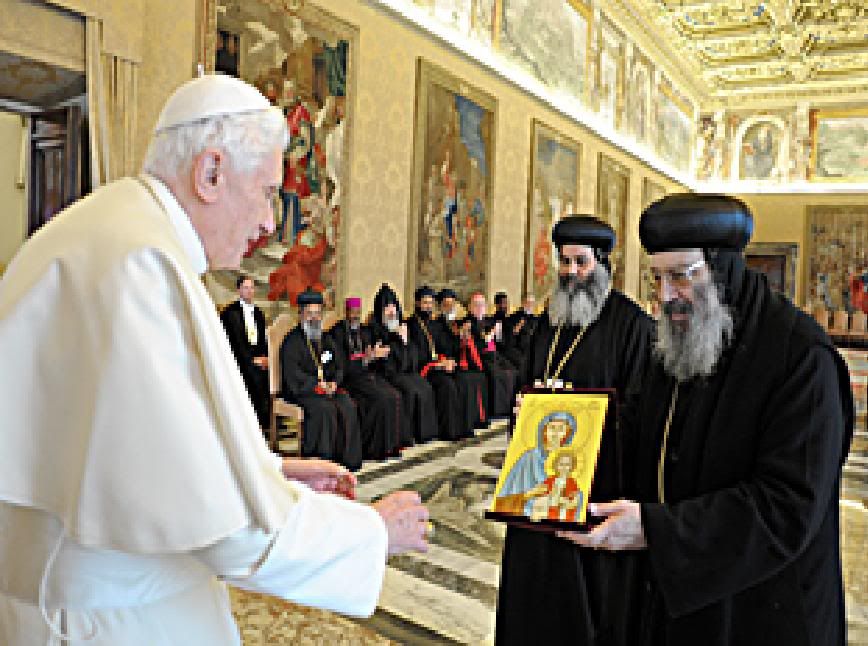
At noon today, the Holy Father met in the Consistory Hall of the Apostolic Palace with the participants of the meeting held in Rome this week of the Mixed International CommisSIon for Theological Dialog between the Catholic Church and the Eastern Orthodox Churches. Here is the text of his address to them, delivered in English:
Your Eminences,
Your Excellencies,
Dear Brothers in Christ,
It is with great joy that I welcome you, the members of the Joint International Commission for Theological Dialogue between the Catholic Church and the Oriental Orthodox Churches. Through you I gladly extend fraternal greetings to my venerable Brothers, the Heads of the Oriental Orthodox Churches.
I am grateful for the work of the Commission which began in January 2003 as a shared initiative of the ecclesial authorities of the family of the Oriental Orthodox Churches and the Pontifical Council for Promoting Christian Unity.
As you know, the first phase of the dialogue, from 2003 to 2009, resulted in the common text entitled Nature, Constitution and Mission of the Church. The document outlined aspects of fundamental ecclesiological principles that we share and identified issues requiring deeper reflection in successive phases of the dialogue.
We can only be grateful that after almost fifteen hundred years of separation we still find agreement about the sacramental nature of the Church, about apostolic succession in priestly service and about the impelling need to bear witness to the Gospel of our Lord and Saviour Jesus Christ in the world.
In the second phase the Commission has reflected from a historical perspective on the ways in which the Churches expressed their communion down the ages. During the meeting this week you are deepening your study of the communion and communication that existed between the Churches until the mid-fifth century of Christian history, as well as the role played by monasticism in the life of the early Church.
We must be confident that your theological reflection will lead our Churches not only to understand each other more deeply, but resolutely to continue our journey decisively towards the full communion to which we are called by the will of Christ. For this intention we have lifted up our common prayer during the Week of Prayer for Christian Unity which has just ended.
Many of you come from regions where Christian individuals and communities face trials and difficulties that are a cause of deep concern for us all. All Christians need to work together in mutual acceptance and trust in order to serve the cause of peace and justice.
May the intercession and example of the many martyrs and saints, who have given courageous witness to Christ in all our Churches, sustain and strengthen you and your Christian communities.
With sentiments of fraternal affection I invoke upon all of you the grace and peace of our Lord Jesus Christ.
Divided Christians must support
one another in suffering, Pope says
By Cindy Wooden

VATICAN CITY, Jan. 28 (CNS) -- When one Christian community is suffering, other Christians must offer assistance, Pope Benedict XVI told Coptic Orthodox and other Oriental Orthodox church leaders.
The Pope met Jan. 28 with members of the Catholic-Oriental Orthodox theological dialogue who were holding their annual meeting in Rome, coming less than a month after a bomb attack on a Coptic Orthodox church in Alexandria, Egypt, left 23 people dead.
"Many of you come from regions where Christian individuals and communities face trials and difficulties that are a cause of deep concern for us all," the Pope told representatives of the Catholic, Armenian Apostolic, Coptic Orthodox, Ethiopian Orthodox, Syrian Orthodox, Malankara Orthodox Syrian and Eritrean Orthodox churches.
"All Christians need to work together in mutual acceptance and trust in order to serve the cause of peace and justice," he said, adding a prayer that the example of the martyrs of both churches would give Christians strength and courage in the face of adversity.
Coptic Orthodox Metropolitan Bishoy of Damiette, Egypt, the co-chairman of the dialogue, thanked Pope Benedict for his prayers for the dead and the injured.
The Coptic leader also praised Egyptian President Hosni Mubarak's commitment to protecting Egyptian Christians and he told the Pope that hundreds of Muslims came out Jan. 7 -- when Copts celebrated Christmas -- to show their support for their Christian neighbors.
The Egyptian government and a leading group of Muslim scholars objected to some of Pope Benedict's comments on the Coptic church bombing, saying they gave the impression that the government does not guarantee the freedom and safety of Egyptian Christians.
Paulist Father Ron Roberson, an official at the U.S. Conference of Catholic Bishops and member of the dialogue commission, said everyone involved in the dialogue was anxious to know how Egyptian Christians were faring, but the situation was not a primary focus in the meeting.
The Catholic-Oriental Orthodox commission's theological dialogue concentrated on "the communion and communication" that existed among different communities in the first five centuries of Christianity.
The Oriental Orthodox churches trace their origins to the Christian communities that did not accept the wording of the Council of Chalcedon's definition in 451 that Christ was fully human and fully divine.
Between 1971 and 1996, the Catholic Church and the individual Oriental Orthodox churches resolved their differences over the Chalcedon statement.
In looking at how the churches maintained unity until 451 despite linguistic, cultural and liturgical differences, the dialogue aims at offering suggestions for how future unity could be achieved without requiring total uniformity.
Pope Benedict told the dialogue participants, "We can only be grateful that after almost 1,500 years of separation, we still find agreement about the sacramental nature of the church, about apostolic succession in priestly service and about the impelling need to bear witness to the Gospel of our lord and savior Jesus Christ in the world."
[Modificato da TERESA BENEDETTA 30/01/2011 08:37] |
| |
 28/01/2011 19:46 28/01/2011 19:46 |
|
| | | OFFLINE | | Post: 22.025
Post: 4.653 | Registrato il: 28/08/2005
Registrato il: 20/01/2009 | Administratore | Utente Master | |
|
 I find this analysis by John Thavis very disappointing, because it is superficial, and it reads like a liberal commentator's run-of-the-mill simplification of the central issue. Worse, IMHO, it is based on false premises. For contrast, I suggest reading the analysis of the Times of India Vatican correspondent and Giuliano Ferrara's editorial on this issue which I posted in the NOTABLES thread last week.
I find this analysis by John Thavis very disappointing, because it is superficial, and it reads like a liberal commentator's run-of-the-mill simplification of the central issue. Worse, IMHO, it is based on false premises. For contrast, I suggest reading the analysis of the Times of India Vatican correspondent and Giuliano Ferrara's editorial on this issue which I posted in the NOTABLES thread last week.
benedettoxviforum.freeforumzone.leonardo.it/discussione.aspx?idd=872...
Vatican tiptoes around
latest Berlusconi scandal
By John Thavis

VATICAN CITY, January 28 (CNS) -- The uproar over the latest sex scandal involving Italian Prime Minister Silvio Berlusconi has found Vatican and other Church leaders mostly keeping mum, hesitant to be perceived as meddling in politics.
[They have not 'kept mum': They simply have avoided publicly condemning Berlusconi by name - something which, in any case, I don't believe the Vatican has ever done with any individual, at least not in the modern era. As the Church does, she condemns the sins but not the sinner.
This Christian attitude towards sinners has nothing to with being 'hesitant to be perceived as meddling iin politics' - especially when, for the first time, everyone who wants to bring Berlusconi down, including the liberals who are most touchy about Church 'interference', have been calling publicly on the Vatican and the Pope to denounce Berlusoni by name, and do not understand why the Church has not excommunicated him outright!]
Although clear moral issues are involved -- Berlusconi is being investigated on accusations of having relations with an underage Moroccan and paying other women to engage in sex parties -- the Vatican's media have yet to report on the saga, which has been front-page news in Italy for weeks.
[That is also not true.. The OR published borh of President Napolitano's statements on the issue, its editor Vian gave an interview to Corriedere della Sera about it, and Avvenire - which reflects the position of the Italian bishops conference - criticizes Berlusconi directly for the bad example he sets for the nation.
Just because Berlusconi has a morally questionable personal lifestyle does not mean the Vatican must single him out for moralizing, because by that logic, it would have to moralize on each and every prominent Italian's moral shortcomings. Other than having to be reminded of the responsibility by public officials to lead by example, Berlusconi's private morals primarily concern him and his confessor, if he goes to confession at all, and his conscience as a Christian.]
Italian bishops have limited themselves to oblique references to morality in civil life, choosing not to mention Berlusconi's name.
[IMHO, the rest of this analysis, even if it cites historical facts, is flawed by its fundamentally mistaken premise that the prudence shown by the Church in its statements is motivated by a desire not to be seen as meddling. After all, she is instantly denounced and excoriated as 'meddling' whenever she speaks up in defense of life and the traditional family, and other Church doctrines that are opposed by the dominant secular-liberal mentality.]
The episode illustrates the limitations on the Church's role in a country that, despite its overwhelmingly Catholic population, has a long history of resentment over clerical interference in politics.
"Toward the Holy See, (Italian) political power has a mixed attitude: reverence for its huge moral influence, and indifference or even impatience when it tries to enter the political arena," [What a monumental understatement!! The secular politicians scream "Interference!' against the Church at the slightest pretext - that's hardly indifference or impatience!], said Massimo Franco, who covers the church and politics for the newspaper Corriere della Sera. [Massimo Franco is not a reporter but a commentator for Corriere; he writes a daily column and is also an editorialist for them.]
Franco told Catholic News Service that one reason the Vatican has been cautious is that it doesn't see any real alternative to Berlusconi, at least not yet.
"It considers the Italian center-left too liberal and hostile. But that creates a slippery situation: moral divergences and political alliances are more and more at odds," he said.
[And that is applying purely political logic to something that is more fundamental: to say iut once more, the Church differentiates between the sin and the sinner. Besides, by the political logic that Franco uses, the Church should have attacked former Prime Minister Romano Prodi directly for the Zapatero-like policies his government tried to legislate, but it never did - even if Berlusconi was always a viable political alternative waiting in the wings.]
The Berlusconi scandal centers on his relationship with a young Moroccan known as "Ruby," who at the age of 17 attended parties at the premier's residence and, in exchange, reportedly received gifts, including jewels and large amounts of money. According to Italian press reports, she and other girls told investigators that Berlusconi hosted what he called "bunga bunga" parties that involved stripteases and sexual acts.
Berlusconi has defended his pleasure-seeking lifestyle but denied paying for sex. He has portrayed himself as the victim of politically motivated prosecutors, who are also investigating him for allegedly using his office to cover up the scandal.
Reactions to the revelations have threatened Berlusconi's hold on power, and Italian and other media have tried their best to drag Pope Benedict XVI into the fray.
When the Pope, addressing Rome policemen in mid-January, made a bland comment on the need for morality in civil society, one headline the next day read: "Ruby: The condemnation of the Vatican."
In fact, the Pope and his aides have been careful to avoid any hint of taking sides. [The Christian equivalent of 'A pox on both your houses!' in this case.]
The head of the Italian bishops' conference, Cardinal Angelo Bagnasco, tried to walk a middle line [He didn't just try, he studiously did, finding fault on both sides, because those who want to take Berlusconi down have obviously over-exploited this scandal for their own political interests] by referring to reports of "behavior contrary to public decorum," but also questioning why these reports have received so much attention from investigating magistrates.
Anyone expecting the Church's "excommunication" of the prime minister has been disappointed, the Italian newspaper Il Giornale commented. [Actually, the comment was by Andrea Tornielli on his blog, as noted earlier on this thread, and was not an editorial position of the newspaper.]
The Church's low-profile approach may reflect the fact that when the Vatican or the bishops take too specific aim at political figures, there's often a public backlash. [Baloney! Is there any example to back that statement at all? In the Prodi government, cabinet ministers, including Catholic ones, were denounced in the Catholic media for their advocacy of anti-Catholic policies like euthanasia and same-sex marriage, but that did not cause any backlash at all. In fact, it probably contributed to the defeat of the liberals by Berlusconi's conservative coalition in the 2008 elections. More recently, Prodi's most liberal Catholic minister, a woman, was defeated for the presidency of Lazio region by a more orthodox Catholic lady.]
" The Church is not looking for sinners to hang from poles or to burn in the public square. It is seeking the salvation of souls, the good of individuals and the good of all," Father Piero Gheddo, an Italian missionary and commentator, told the newspaper Il Foglio.
"The Church evaluates politicians on the facts, not so much on their private life," he said. [There you are. Thavis should have cited this earlier in the article.]
In short, the prevailing attitude among Italian Church leaders is that a politician's personal moral failings are best addressed in the confessional, not in the pulpit. [DUH!]
The problem posed by Berlusconi is that he claims to work in the Church's best interests -- which may be true on certain issues like aid to private schools, but not when the premier, now twice-divorced, shows up for the Church's annual "Family Day" celebration of traditional values.
[But he has consistently acted to support the Church's conservative and traditional line on most social issues, and has held the line against euthanasia, same-sex marriage and liberalizing laws on abortion and assisted reproduction. Of course, as a Catholic, he must be faulted for his divorces and his libertinism, but that is his personal problem with his confessor and with God. Are his dalliances and sexual proclivities any worse than all the dcoumented disclosures that have emerged about the private lifsteyles of John Kennedy and Edward Kennedy? I think shortsightedness clouds Thavis's analysis in this respect.]
After meeting Pope Benedict in 2008, Berlusconi proclaimed their common views on "the sacred nature of the human person and the family" -- and gave the Pope a jewel-studded crucifix.
[Berlusconi has never hidden the fact that he is most anxious to be in the good graces of the Pope - he has gone out of his way on at least two occasions to meet with the Pope in unscheduled circumstances. But I would not think of his gift as a 'bribe' - as a billionaire, he was presenting a gift worthy of the person he was presenting it to.
However, like all men who are wealthy and powerful beyond common imagination, he does not see his own faults - in this case, the glaring, heedless amorality of his private life. Of course, persons like him are very much in need of a comeuppance, but that will come from other factors that he himself provokes and which he will not always be able to control, not from the Church, which is not in the business of playing 'Gotcha!' but of saving souls.]
The German Pope has tended to de-emphasize the Church hierarchy as a political player in Italy. In a major address to Italian Catholics in 2006, he said it was the responsibility of Catholic laypeople -- and not the church as an institution -- to bring the Gospel to political life, operating "as citizens under their own responsibility."
There are historical reasons why such a strategy makes sense in Italy, where the Church's temporal and political power of past centuries is still a source of resentment. [To whom, though? To seculars, liberals and dyed-in-the-wool anti-clericalists, not to the general public!] In March, Italy is celebrating 150 years as a unified nation, and for the Church it's a reminder of a painful transition that included the loss of the Papal States.
After decades of revolts that were resisted by Popes, the first Italian Parliament proclaimed an Italian kingdom in 1861 and declared Rome to be its capital. Pope Pius IX told Catholics not to support this effort, under threat of excommunication. Rome was defended by the papal army for years, but was captured in 1870.
Pius IX declared himself a prisoner in the Vatican -- a situation that was repaired only in 1929, when the Italian dictator Benito Mussolini made a treaty that regulated the Church's position and its much-reduced territories in Italy. [A rather cavalier way of describing the Lateran Pacts and their enduring significance for the Church, if only for conferring sovereignty on the Vatican. The Fascist Mussolini is hardly ever given credit for this! And it would be foolish to think that any of the modern Popes, including Blessed Pius IX, has ever mourned the loss of the papal States, and thereby, of temporal power!]
Italians often point to those events to explain persistent anti-clericalism and antipathy toward the Church as a political actor.
The upcoming 150th anniversary celebrations will give Vatican and Italian Church leaders a chance to revisit that chapter of history, and perhaps draw some lessons in Church-State relations. [Which have never been better. The italian electorate has rejected liberal politicians in the most recent national and regional elections, and there is unusual harmony between Italian President Napolitano and Pope Benedict.]
If the past is any guide, "Rubygate" and "bunga bunga" will not be part of that reflection.
[Modificato da TERESA BENEDETTA 28/01/2011 20:01] |
| |
 29/01/2011 00:54 29/01/2011 00:54 |
|
| | | OFFLINE | Post: 362
Post: 85 | Registrato il: 28/05/2007
Registrato il: 19/02/2009 | Utente Comunità | Utente Junior | |
|
Germany and the Papal visit We'll have more of that as the weeks go by - even though I don't think that this letter will be a big deal, considering it's more than 40 years old - only that it may please the 'two different Ratzingers' crowd.
The media is gearing up for the Papal visit already, and so are the usual suspects: we are church, 'professional catholics', the pro-Jesus-anti Church movement and a few hapless politicians (of all people!).
This visit must NOT be a success!! I think they were all horrified after the UK visit and are now already preparing their battle plans.
If it's the mayor of Berlin, members of the cabinet, or members of catholic dissent, they'll all be pontificating until the day the Holy Father arrives and the media will give them as much room as they want.
![[SM=g1782473]](https://im1.freeforumzone.it/up/17/73/324410086.gif)
In once sense... I do hope that all that will backfire and awaken the slumbering giant formerly known as German Catholicism – at least the active part of it.
I know that we'll have a few fearless Bishops we can count on: Card. Meisner, Bishops Gerhard Ludwig Müller, Gregor Maria Hanke, Franz-Peter Tebartz-van Elst and possibly Card. Reinhardt Marx.
There will be a LOT of hostility in Berlin - the former capital of the Prussian Empire, home of Bismarck’s Kulturkampf and home of the most ultra-left wing, aggressive, militant Church haters you may find in Europe.
![[SM=g8126]](https://im0.freeforumzone.it/up/0/26/3169140.gif)
Then you add the notorious anti-Rome attitude Germans have had for centuries... and you have an interesting challenge ahead for our soft spoken, gentle, gracious, impeccably mannered Pope with a VERY detectable Bavarian accent - even when he attempts not to let it show - which is really not possible.
His courage is inspiring! ![[SM=g8431]](https://im0.freeforumzone.it/up/0/31/3760226.gif)
 Thanks for the warning, Heike! I must admit I hadn't even begun to think about the anti-Ratzi campaign that his own fellow Germans will wage against him before and during the visit, much less that this letter out of the blue was some sort of opening salvo. The prospects are frightening, simply because it can all be so nasty, and so unnecessary... Of course, the Holy Spirit will be with him, and he will handle it all with his habitual grace even under pressure... Still, one wishes this was still a world where age at least deserves respect anc consideration.... We can only pray.... BENEDICTS QUI VENIT IN NOMINE DOMINI!
Thanks for the warning, Heike! I must admit I hadn't even begun to think about the anti-Ratzi campaign that his own fellow Germans will wage against him before and during the visit, much less that this letter out of the blue was some sort of opening salvo. The prospects are frightening, simply because it can all be so nasty, and so unnecessary... Of course, the Holy Spirit will be with him, and he will handle it all with his habitual grace even under pressure... Still, one wishes this was still a world where age at least deserves respect anc consideration.... We can only pray.... BENEDICTS QUI VENIT IN NOMINE DOMINI!
TERESA
[Modificato da TERESA BENEDETTA 29/01/2011 02:26] |
| |
 29/01/2011 07:17 29/01/2011 07:17 |
|
| | | OFFLINE | | Post: 22.027
Post: 4.655 | Registrato il: 28/08/2005
Registrato il: 20/01/2009 | Administratore | Utente Master | |
|
 One of the most outstanding of Pope Benedict XVI's appointments has been that of Cardinal Angelo Bagnasco, whom he plucked from the low-profile post of bishop for Italy's military in 2007 to succeed Cardinal Camillo Ruini, who had led the Italian bishops' coinference for 16 years. Recommended by Ruini himself, he quickly proved to be his own man, following and carrying out Benedict XVI's line as Ruini did, but in his own way, tending to attract less polemic than the dynamic political activism of the equally mild-mannered Ruini.
One of the most outstanding of Pope Benedict XVI's appointments has been that of Cardinal Angelo Bagnasco, whom he plucked from the low-profile post of bishop for Italy's military in 2007 to succeed Cardinal Camillo Ruini, who had led the Italian bishops' coinference for 16 years. Recommended by Ruini himself, he quickly proved to be his own man, following and carrying out Benedict XVI's line as Ruini did, but in his own way, tending to attract less polemic than the dynamic political activism of the equally mild-mannered Ruini.
His addresses as CEI president and as Archbishop of Genoa have been models in defining the pastoral agenda for the Church in Italy, as well as in underscoring the evangelical and theological emphases of Benedict XVI. He came up with another remarkable surprise in his homily for the concluding Mass of the CEI Permanent Council's winter meeting in Ancona this week.
Cardinal Bagnasco urges priests:
Emulate the Pope who carries out
his mission without fear of criticism

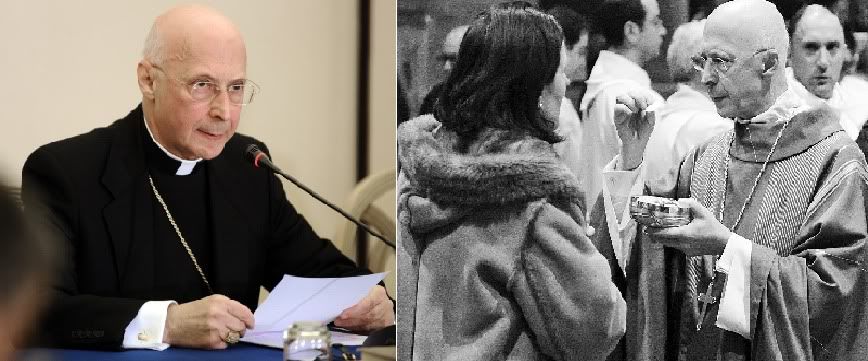
Rome, Italy, Jan 27, 2011 (CNA) - Cardinal Angelo Bagnasco of Genova, Italy said that priests should follow the model of Pope Benedict XVI in fulfilling their missions without fear of criticism.
The country's bishops were gathered in Ancona, Italy for the conclusion of their winter meetings on Jan. 27. Cardinal Bagnasco, president of the bishops’ conference, gave the homily during the closing Mass in the city's cathedral.
"If the nihilistic culture tends to erase the interior life of people, priests must help the faithful to rediscover it,” Cardinal Bagnasco. “And in this mission they cannot be afraid of incomprehension or criticisms."
"The example to follow is that of Pope Benedict XVI, who teaches us humility, the disarming clarity of the truth, the lucid wisdom of dialogue, the ardent prudence of action, freedom before the world and the courage that comes from knowing he is in the hands of God."
Cardinal Bagnasco added that priests have the task of maintaining their hope without hesitation. This hope enables them to respond to the expectations "not only of the Catholic community, but also those the whole of society demands of us — despite our limits and weaknesses — words that echo those of the Lord."
"We are called and driven to put the light of our priesthood in service to the world, to relate it to the many spheres of life, and to illuminate the perennial questions of the mystery of pain and death, the meaning of our being, each of our destines, the reason for this extraordinary and dramatic universe and the moral good and evil," the cardinal said.
He encouraged priests to fight against the routine that makes "life fade" and "dulls the faith," which "numbs the vibration of the soul before the Eucharistic mystery."
The cardinal exhorted his fellow priests to "remember daily the 'yes' to him who chose us by his mercy and who invested us with his priesthood."
|
| |
 29/01/2011 14:59 29/01/2011 14:59 |
|
| | | OFFLINE | | Post: 22.029
Post: 4.657 | Registrato il: 28/08/2005
Registrato il: 20/01/2009 | Administratore | Utente Master | |
|
 Saturday, January 29, Third Week in Ordinary Time
Saturday, January 29, Third Week in Ordinary Time
 From left: A children's book on Juniper; Murillo's 1618 painting; and the Brother Juniper cartoon.
Servant of God BROTHER JUNIPER [Fra Ginepro] (Italy, d 1258)
From left: A children's book on Juniper; Murillo's 1618 painting; and the Brother Juniper cartoon.
Servant of God BROTHER JUNIPER [Fra Ginepro] (Italy, d 1258)
One of the original Franciscans with St. Francis
Little is known about Ginepro's life before he joined Francis and his band of brothers in 1210, except
that he was a close friend of Francis from his younger days. Although he has come down in Franciscan
annals as the 'Franciscan clown' or 'jester of the Lord', he was entrusted by Francis to set up
Franciscan 'places' in Gualdo and Viterbo, and he was with St. Clare, conforting her on her deathbed.
He was renowned for his simplicity and kindness. A 1618 Murillo painting depicts him about to give up
his garments to a beggar. Five centuries later, the 18th-century missionary Junipero Serra would take
his religious name from Francis's friend. In 1958-1989, Brother Juniper inspired a popular syndicated
cartoon depicting him in modern situations.
Readings from today's Mass: www.usccb.org/nab/readings/012911.shtml
OR today.
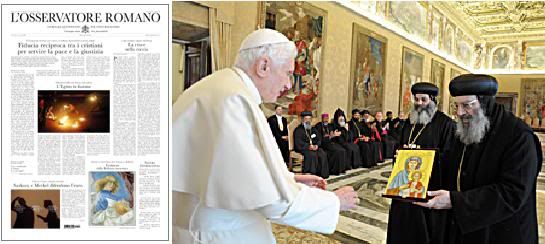
Pope addresses International Commission for Catholic-Orthodox theological dialog:
'Christins must have reciprocal trust to serve peace and justice'
He expresses participation in the difficulties faced by Christians
in many parts of the world
Other Page 1 items: An essay on the ancient roots of Christianity in Ethiopia; Egypt 'in flames'
as street uprisings continue calling for President Mubarak to step down after 30 years; at the
Davos World Economic Forum, the presidents of Germany and France defend the euro. In the
inside pages: Iraq forms a government commission to look after religious minorities and deal
with continuing terrorist threats against them; and Cardinal Tauran, president of the Pontifical
Council for Inter-Religious Dialog, says the Church will pursue dialog with Islam regardless
of temporary drawbacks like Al-Azhar's suspension of annual talks with his Council.
PAPAL EVENTS TODAY
The Holy Father met today with
- The community of the Pontifical Ethiopian College in the Vatican. Address in Italian.
The Vatican released the video and text of the Holy Father's message to the Pontifical University of Santo Tomas
in Manila, Philippines, which marked the 400th anniversary of its founding yesterday on the Feast of St. Thomas
Aquinas, at which the Pope was represented by Cardinal Zenon Grocholewski, Prefect of the Congregation for
Catholic Education. Older than Harvard, UST is Asia's oldest university.
[Modificato da TERESA BENEDETTA 30/01/2011 08:06] |
| |
 29/01/2011 17:58 29/01/2011 17:58 |
|
| | | OFFLINE | | Post: 22.030
Post: 4.658 | Registrato il: 28/08/2005
Registrato il: 20/01/2009 | Administratore | Utente Master | |
|

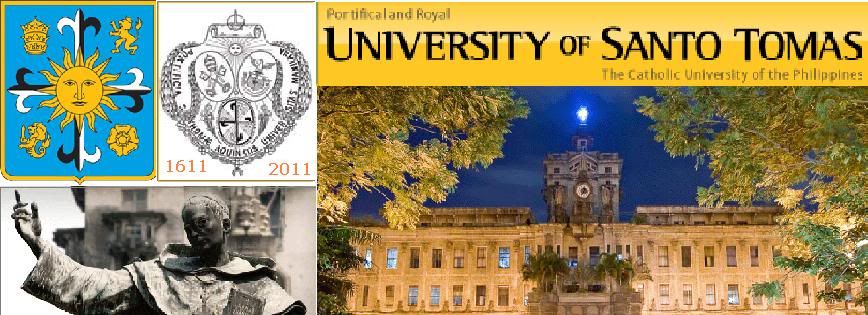 Pope's videomessage on 400th anniversary
Pope's videomessage on 400th anniversary
of Asia's oldest university

January 29, 2011
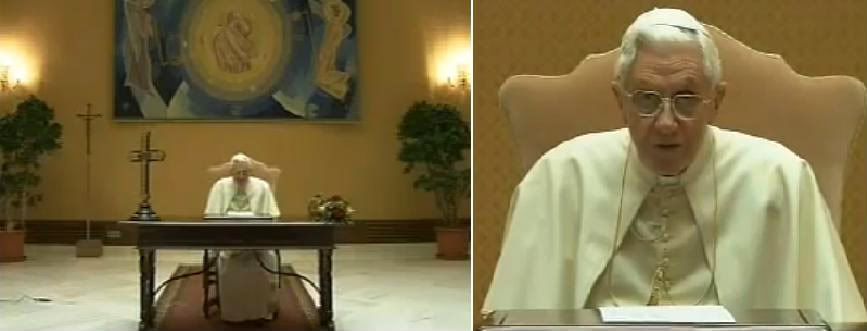
The Holy Father taped a videomessage in English for the University of Santo Tomas (UST) in Manila, Philippines, which began its 4th centenary jubilee year yesterday on the feast of St. Thomas Aquinas, in the presence of Benedict XVI's personal envoy to the occasion, Cardinal Zenon Grocholewski, prefect of the Congregation for Catholic Education.
[UST was founded by the Dominicans in 1611 as a pontifical and royal university, and is Asia's oldest university, founded 25 years before Harvard University, the oldest university in the New World. It has a current enrollment of about 42,000, apparently the world's largest single-campus Catholic university..]
Your Eminences, Your Excellencies, Dear Friends,
I am pleased to send my warm greetings to the students, staff and alumni of the Pontifical University of Santo Tomas as you celebrate the four-hundredth anniversary of its foundation.
This is a signifìcant event in the life of the Church and, although I cannot be with you physically, I am happy to speak to you personally in this way, to unite myself to you spiritually, and to offer all of you my affectionate congratulations on this happy occasion.
It is with thanksgiving that I recall the many clergy, religious and laity who, at Santo Tomas, have handed down to generations of Filipinos the faith, knowledge and wisdom to be found in the religious and secular sciences.
In particular, I salute the memory of your founder, Bishop Miguel de Benavides, and the great commitment of the Dominicans who have guided the institution through the many challenges of the past four centuries.
As you know, the University of Santo Tomas is the oldest institution of Catholic higher education in the Far East and it continues to play a very important role in the Church throughout the region.
I am confident that, keeping in mind the faith and reason that are always part of a truly integrated approach to education, your University will continue to contribute to the intellectual, spiritual and cultural enrichment of the Philippines and beyond.
I also pray that you will always seek a knowledge of matters human and divine in the light of that ultimate clarity found in the person of Jesus Christ (cf. Jn 8: 12).
Invoking the wise intercession of your heavenly patron, Saint Thomas Aquinas, I willingly impart to you my Apostolic Blessing as a pledge of grace and peace.
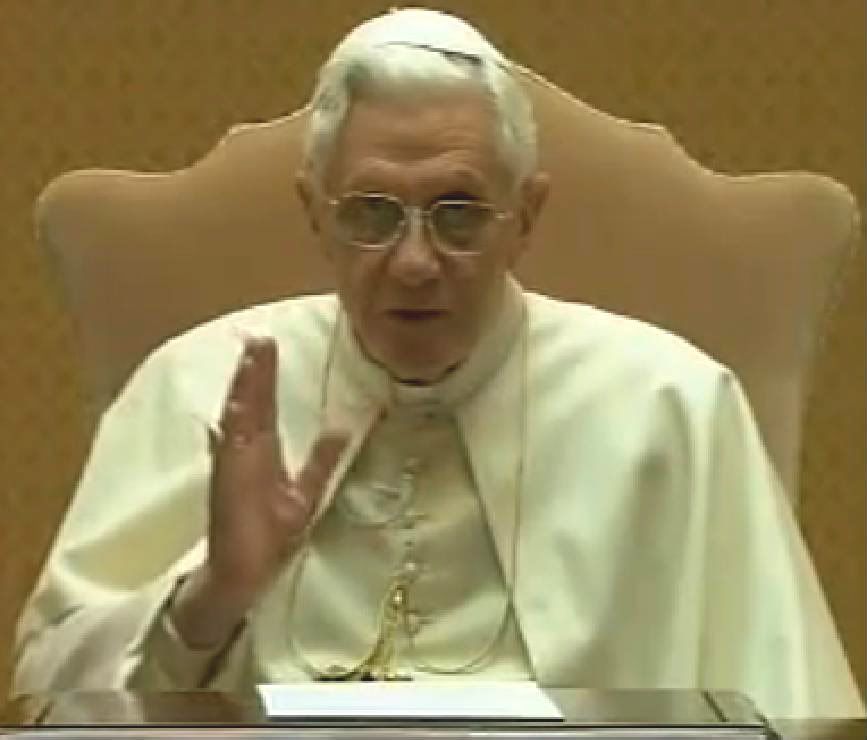

[On a personal note, while I am very proud as a Filipina of UST's glorious history, I did not attend it, going instead to the University of the Philippines, the country's first (and for a long time the only) state university. It was founded by the U.S. government in 1908, eariy in their colonial administration of the Philippines, and it quickly developed into one of the most outstanding universities in the Third World. Seven of my paternal aunts and uncles had attended UP, and there was never any question for me of going to another university. At the time I attended UP, however, the university's Student Catholic Action was the biggest student organization on campus (under an Irish Jesuit chaplain who was the most orthodox of Catholic priests and the most literate of preachers), and UPSCA provided us with the best and most productive extra-curricular activities - so I had the best of both worlds: an excellent education that was secular and open, and a nurturing Catholic environment on campus.
[Modificato da TERESA BENEDETTA 30/01/2011 01:21] |
| |
 29/01/2011 22:13 29/01/2011 22:13 |
|
| | | OFFLINE | | Post: 382
Post: 25 | Registrato il: 17/05/2006
Registrato il: 02/05/2009 | Utente Comunità | Utente Junior | |
|
Teresa - I was wondering about your alma mater in the Philipines. Thanks for the info. The very few Filipinos/(Filipina??) that I have had the pleasure of meeting in real life and on forums have proved to be so impressively educated, multi-lingual, well-mannered but also passionate that I would love to one day visit the Philipines. I have told you before about the high regard we in SA have for the Philipine Madrigal Singers; and from the moment I have heard and SEEN them (beautiful!) in 1989 I have been intrigued by your country.
 Hi Mags! - I would love to have you visit the Philippines, and as my guest! I've done the Manila-Kuala Lumpur-Cape Town-Buenos Aires round trip before (one of the best long airline routes today), and maybe the next time I go to Buenos Aires from New York (a possibility around Christmas time this year), I could 'pick you up', sort of, in Cape Town, and we could fly to Manila together! (My Buenos Aires connection is another story altogether)...
Hi Mags! - I would love to have you visit the Philippines, and as my guest! I've done the Manila-Kuala Lumpur-Cape Town-Buenos Aires round trip before (one of the best long airline routes today), and maybe the next time I go to Buenos Aires from New York (a possibility around Christmas time this year), I could 'pick you up', sort of, in Cape Town, and we could fly to Manila together! (My Buenos Aires connection is another story altogether)...
Anyway, the Madrigal Singers - who are still officially the UP Madrigal Singers, as they originated in the UP College of Music in 1963, though they perform abroad as the Philippine Mdrigal Singers - are still doing very well and keeping madrigal singing vibrantly alive and adapted to many kinds of music! Andy Veneracion, the lady choirmaster at the time you first saw them, retired in 2001 - two years eerlier, she was named National Artist for Music (the first one for acheivement in choral music). The 'MADZ' as they are known semi-officially, won the European Grand Prize for Choral Singing twice (1997 in Tours, and 2007 in Arezzo. the only group so far to have won twice) and in 2008, they were named UNESCO Artists for Peace.
TERESA
[Modificato da TERESA BENEDETTA 30/01/2011 01:15] |
| |
 30/01/2011 07:53 30/01/2011 07:53 |
|
| | | OFFLINE | | Post: 22.031
Post: 4.659 | Registrato il: 28/08/2005
Registrato il: 20/01/2009 | Administratore | Utente Master | |
|

 Pope urges Ethiopian priests and
Pope urges Ethiopian priests and
seminarians to 'walk in holiness'
Translated from

January 29, 2011
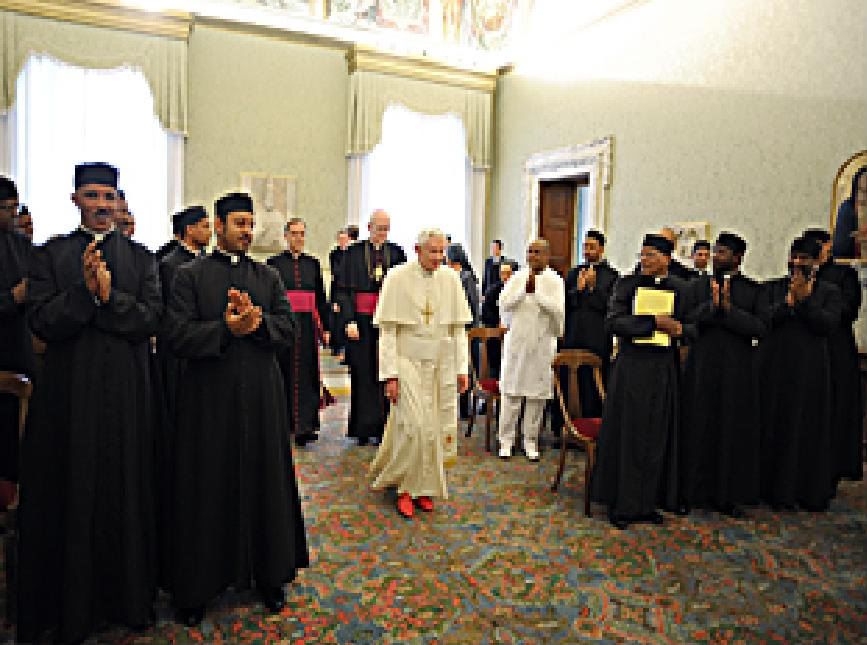
On Saturday morning, the Holy Father granted an audience in the Hall of the Popes of the Apostolic Palace to the community of the Pontificio Collegio Etiopico which is located in the Vatican Gardens.
[The Pontifical Colleges of Rome, sometimes known as the Roman colleges, are institutions established and maintained in Rome for the education of future priests. Traditiona;ly, each college is for students of a particularly nationality and also serve as their residence. Incidentally, the private apartment to which Cardinal Angelo Sodano retired after his term ended as Secretary of State is in the Ethiopian college.]
Here is a translation of the Pope's address, delivered in Italian:
I am happy to welcome you on the happy occasion of the 150th anniversary of the birth in heaven of St. Giustino de Jacobis. I cordially greet each of you, dear priests and seminarians of the Pontificio Collegio Etiopico, which Divine Providence has situated near the tomb of the Apostle Peter - a sign of the ancient and profound bond of communion uniting the Church in Ethopia and Eritrea with the Apostolic See.
I especially greet the Rector, Fr. Teclezghi Bahta, whom I thank for the kind words with which he introduced our meeting, recalling the various significant circumstances which motivated it. I welcome you today with special affection, and together with you, I would like to reflect on your community of origin.
I wish to dwell on the luminous figure of St. Giustino de Jacobis, whose anniversary you celebrated last July 31. Worthy son of St. Vincent de Paul, Giustino lived in an exemplary way his principle of 'doing everything for everyone', especially in the service of the Abyssinian people. [Abyssinia is the old name for Ethiopia].
Sent at age 38 by Cardinal Franzoni, the then Prefect of Propaganda Fide [Propagation of the Faith, old name for the Congregation for the Evangelization of Peoples], as a missionary in the Tigrai region of Ethiopia, he worked first in Adua and then in Guala, where he soon thought about formation of Ethiopian priests. giving life to a seminary that he called Collegio dell'Immaccolata.
With zealous ministry he worked tirelessly so that that portion of the People of God would recover the original fervor of the faith that had been sowed by the first evangelizer St Frumentius (cfr PL 21, 473-80). Justin intuited with farsightedness that attention to the cultural context should be a favored way through which the grace of the Lord would form new generations of Christians.
Learning the local language and promoting the plurisecular liturgical tradition of the rite that was proper to the community, he also did his best to do effective ecumenical work.
For more than two decades, his generous ministry, first as a priest then as bishop, worked for the benefit of all he econountered and loved as vital members of the people entrusted to his care.
For his passion to educate, especially in the formation of priests, he can rightly be considered the patron of your college. Indeed, even today, this worthy institution welcomes priests and candidates for priesthood in their effort for theological, spiritual and pastoral formation.
Re-entering your communtties of origin, or accompanying fellow nationals who have emigrated abroad, you must learn to inspire love of God and of the Church in each one , following the sxample of St. Giustino De Jacobis.
He crowned his fecund contribution to the religious and civilian life of Abyssinians with the gift of his life, silently given back to God after many sufferings and persecutions. He was beatified by the Venerable Pius XII on June 25, 1939, and canonized by the Servant of God Paul VI on October 26, 1975.
Dear priests and seminarians, even for you, the way of holiness is indicated. Christ continues to be present in the world and to reveal himself through those who, like St. Giustino De Jacobis, allow themselves to be animated by his Spirit.
We are reminded of this by the Second Vatican Council, when it says: "In the life of those who, while taking part in our human nature, are nonetheless more perfectly transformed into the image of Christ (cfr 2 Cor 3,18), God vividly manifests his presence and his face to men. In them it is he himself who speaks to us and shows us the sign of his Kingdom" (Dogmatic Const. Lumen gentium, 50).
Christ, the Eternal Priest of the New Covenant, who through the special vocation to the priestly ministry, has 'conquered' our life, does not suppress the characteristic qualities of a person. On the contrary, he uplifts, he ennobles, and making priests his own, calls them to serve his mystery and his work.
God needs each of us "to show future generations the extraordinary richness of his grace through his goodness to us in Christ Jesus"
(Eph 2,7).
Notwithstanding the individual character of each one's vocation, we are not separated one from the other - instead we support each other, in communion within one spiritual organism.
We are called to form the total Christ, a unity recapitulated in the Lord, vivified by his Spirit to become his pleroma [manifestations of divine power] and to enrich the canticle of praise that he raises to tbe Father.
Christ is inseparable from the Church which is his Body. It is in the Church that Christ conjoins to him most closely all who are baptized, and nourishing them at the Eucharistic banquet, makes them take part in his glorious life (cfr Lumen gentium, 48).
Holiness is at the very heart of the ecclesial mystery and it is the vocation to which we are all called. Saints are not an ornament which adorn the Church externally but are like the flowers of a tree that reveal the inexhaustible vitality of the sap that runs through it.
It is beautiful to contemplate the Church this way, in ascent towards the fullness of the Vir perfectus, the perfect man, in continuous, progressive maturation, dynamically impelled towards total fulfillment in Christ.
Dear priests and seminarians of the Pontificio Collegio Etiopico, with joy and dedication, live this important period of your formation in the very shadow of St. Peter's dome - walk resolutely on the way to holiness.
You are a sign of hope, especially for the Church in your countries of origin. I am sure that your experience of communion here in Rome will help you make your contribution to growth and peaceful coexistence in your beloved countries.
My prayers are with you, and through the intercession of St. Giustino De Jacobis and the Virgin Mary, I impart with affection my Apostolic Blessing, which I gladly extend to the Sisters of the Child Mary, to the personnel of the college and all the persons dear to you.
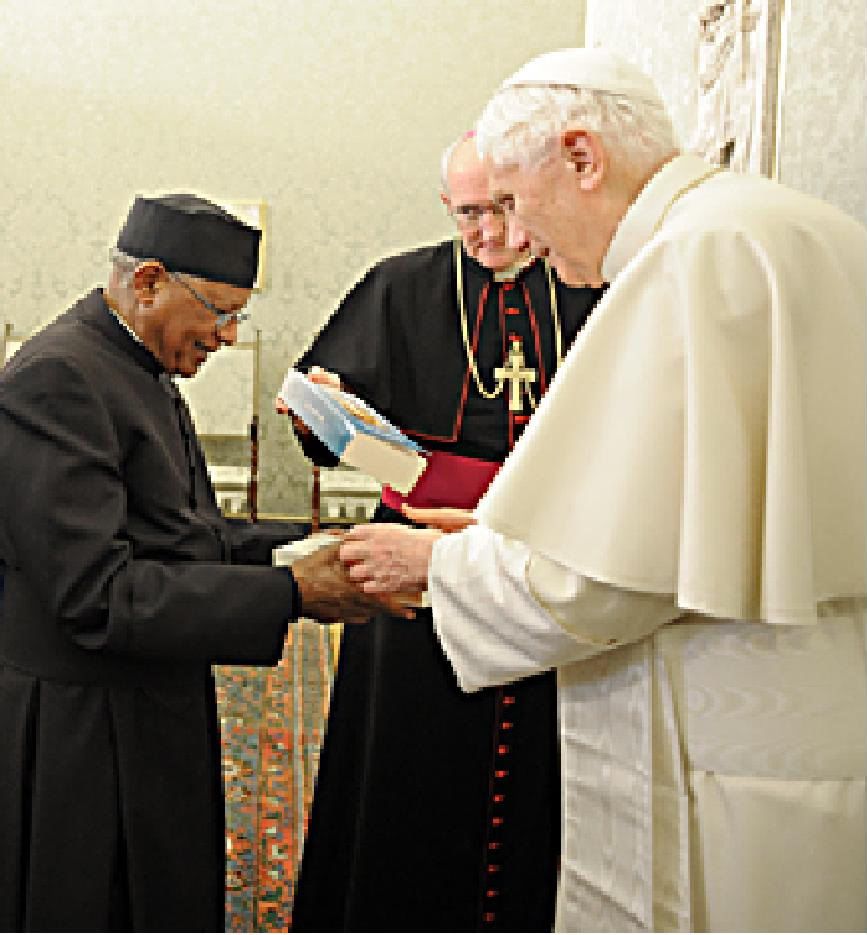 NB: Christianity in Ethiopia dates to the fourth century AD, and this long tradition makes Ethiopia unique among the sub-Saharan African countries. Christians make up 63% of the population but the largest group are the Orthodox Christians, numbering about 32 million. There are less than 600,000 Roman Catholics compared to 14 million Protestants.
NB: Christianity in Ethiopia dates to the fourth century AD, and this long tradition makes Ethiopia unique among the sub-Saharan African countries. Christians make up 63% of the population but the largest group are the Orthodox Christians, numbering about 32 million. There are less than 600,000 Roman Catholics compared to 14 million Protestants.
[Modificato da TERESA BENEDETTA 30/01/2011 08:05] |
| |
 30/01/2011 14:58 30/01/2011 14:58 |
|
| | | OFFLINE | | Post: 22.032
Post: 4.660 | Registrato il: 28/08/2005
Registrato il: 20/01/2009 | Administratore | Utente Master | |
|
 It could be. If I had to decide, I would say the ears are conclusive, and that baby face is so endearing...
WHAT DO YOU THINK:
It could be. If I had to decide, I would say the ears are conclusive, and that baby face is so endearing...
WHAT DO YOU THINK:
A snapshot from Benedict's past?
By TIM STONESIFER
The Evening Sun
1/30/2011
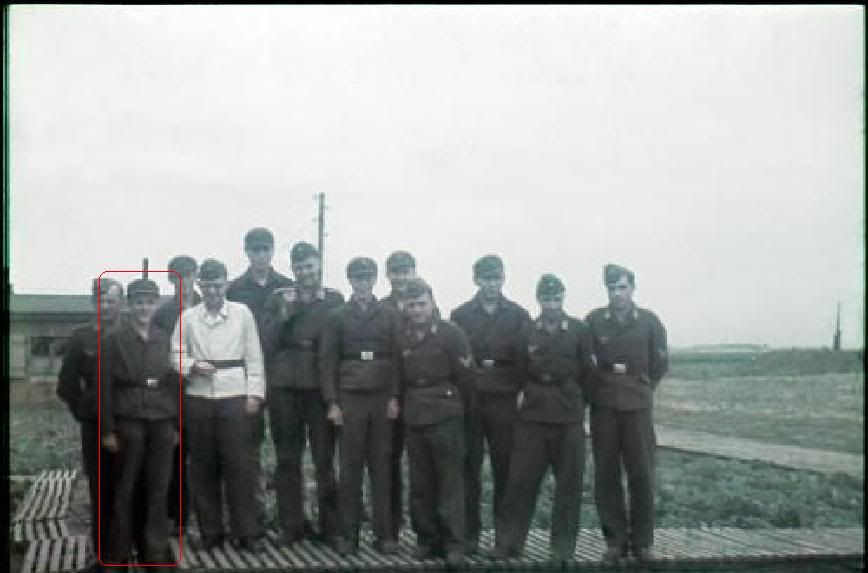
HANOVER, Pennsylvania - A color scan of a group of German soldiers and their Hitler Youth helpers from WWII shows one boy, front row on the far left, who bears a strong resemblance to a young Joseph Ratzinger, or Pope Benedict XVI. [The picture appears to be B&W but the faces and hands have flesh tones, so obviously an inferior color shot.]
The slide is owned by a Hanover-area man, who hopes to confirm whether it s only the second such known slide of Ratzinger in a boy in the Hitler Youth.
[We Benaddicts know, of course, there is another picture which has been used in all Germand Italian documentaries about Benedict XVI since he became Pope - the one below:]
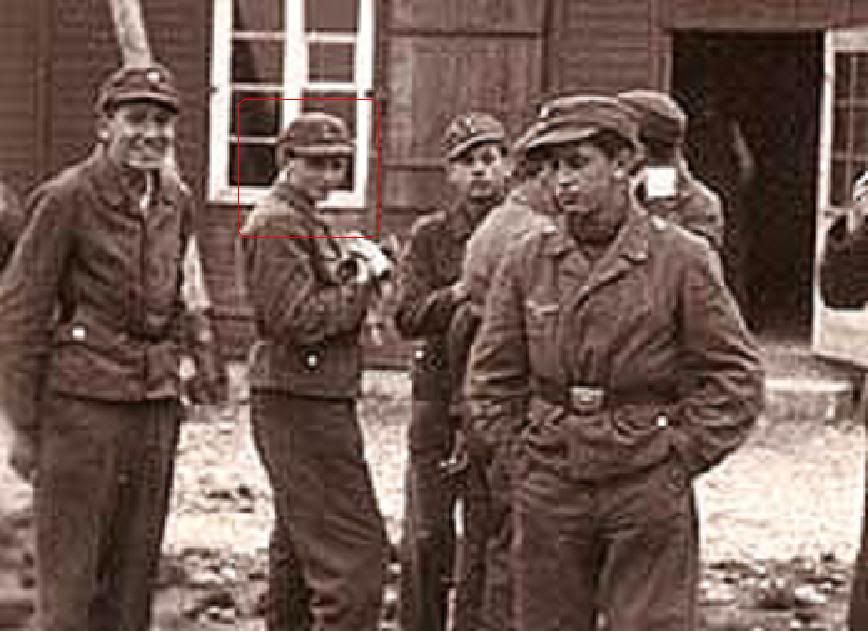
The following comparison shows the Pope, posed and stern in his familiar picture clad in the uniform of the Hitler Youth, and a closer look at the boy in the newly unearthed picture.
That the Pope -- then a skinny German boy named Joseph Ratzinger -- was conscripted to Adolph Hitler's youth movement for a time during the war is now common knowledge. That an image of the young man in Nazi attire exists is well known, too, with that single grainy black-and-white photo held by the Getty Research Institute.
The Vatican and other Catholic officials have for years acknowledged openly, if perhaps with some reluctance, [What nonsense! when Cardinal Ratzinger himself wrote about it in MILESTONES!] the distant past of their spiritual leader, who was elected Pope Benedict XVI in 2005. The war was a dark time in history, they've said, and that young man soon left the military and soon went on to help countless souls.
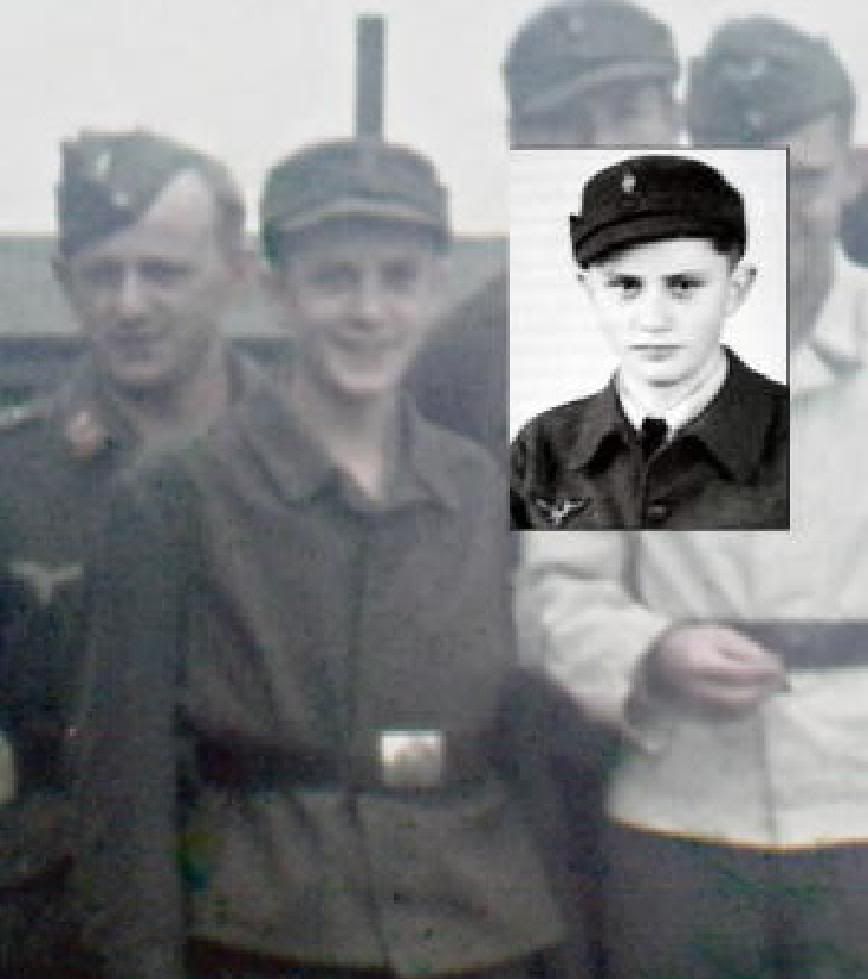 The newspaper's caption:A picture of Joseph Ratzinger in the only known black-and-white image from his time in the Hitler Youth is shown next to a close-up view of a young man in a slide owned by David Williams. The comparison shows a number of similarities in the two boys faces, though Williams has been unable to confirm they are a match.
The newspaper's caption:A picture of Joseph Ratzinger in the only known black-and-white image from his time in the Hitler Youth is shown next to a close-up view of a young man in a slide owned by David Williams. The comparison shows a number of similarities in the two boys faces, though Williams has been unable to confirm they are a match.
Today, he smiles for pictures, celebrates Mass and blesses more than a billion followers.
And now here's the newly- discovered image -- showing a boy with a grin and a low-slung cap, who looks quite a bit like the first.

This time the boy's posed with comrades, in color, on an old 35 mm slide. Looking close, an anti-aircraft gun in the distance suggests a German flak unit, like the one to which young Ratzinger was conscripted. The hilly terrain suggests the Munich area, where he's known to have served. Again there's the uniform, the right era.
And now, too, there's a sideways grin, an expression that under that old cap seems to hold a hint of the Pope's often asymmetrical
smile. There's the shape of the head, those ears.
So is this the second-known image of the Pontiff during his Nazi conscription, the first ever found in color? That remains to be confirmed.
What's known so far is this: the slide was discovered by a Hanover-area man, David Williams; it came from Germany, after Williams purchased it on eBay in 2009; both Williams and the former editor of a German photography magazine believe that slide shows the Pope.
David Williams began collecting old cameras, photographs and negatives about 30 years ago, he said. A history buff from a young age, Williams' interest was sharpened and focused on old photo memorabilia while he was stationed at an Army base in Germany in the 1970s.
There he would troll the local flea markets and antique shops, and quickly learned of both the Germans' love affair with early color photography before and during World War II, and the resulting glut of images from that era. There were shots of family life, Williams said, of local attractions and architecture.
And of course, through photography, the war was recorded, Williams said, with German soldiers carrying cameras, snapping pictures as they traveled, often with the latest and best equipment.
"The Germans always wanted to create the perfect format," he said, "to make the best pictures."
Williams eventually brought home to Hanover a similar passion for those excellent early images -- and quite a collection of them.
And from there his hobby only grew. A scientist and researcher by day, Williams nonetheless spent years of evenings and weekends looking in local shops and scouring the Internet for finds. Along the way he sold some to collectors, and had more than a few old and unique slides published in photography magazines.
You just develop an eye for the unusual after a while, Williams said.
So maybe that's what it was, on a fall night in 2009, when that image of a Luftwaffe Flak unit popped up on Williams' computer monitor. He saw it was war-era, he said, saw it was a German anti-aircraft unit, that it was a color slide. A nice piece, he said.
It was being sold from Germany for about 5 euros, he said, or around $7. So why not?
Holding that slide in his hand, Williams said it was actually a few weeks later -- the slide scanned and stowed in his large collection -- when he happened across a picture of the Pope, of Joseph Ratzinger. And something clicked.
From there Williams found online the only existing picture of the young Ratzinger, currently held by the Getty Research Institute, showing him in the attire of the Hitler Youth.
"I looked at the two side-by-side," he said, "and they looked awfully, awfully close."
Ulrich Vogt is a retired German school teacher and former editor of a respected photography magazine, who today lives in a town of grand cathedrals and museums, where Charlemagne was once crowned Holy Roman Emperor by Pope Leo III. From that historic town of Paderborn, he's written a dozen books on varying subjects, and a score of scholarly articles on German photography. He has a small photo collection of his own, and has long studied old photographs and cameras.
He met Dave Williams collecting online a few years ago, and he's seen the scans of Williams' slide.
"It is the Pope as a young German 'Flakhelfer,'" Vogt said via e-mail. There's no doubt, he said.
Yet when Williams and Vogt -- an ocean apart but the common goal of verifying the slide between them -- began the search in 2009 to have the image authenticated, they ran into a brick wall spanning two continents.
Vogt said he approached countless German newspapers and several photo agencies, but all were unwilling to publish a story or help authenticate the slide. It's a shame, he said, because placing the photo in a nearby Bavarian newspaper would be the best way to confirm the presence of Ratzinger and the other soldiers shown. [It is surprising why! Especially as the earlier group photo has been widely used. And how is it that neither Vogt nor Williams seem to be aware of that earlier photo?]
"But I think especially the Bavarian newspapers of the region where Ratzinger grew up and where he studied, was priest, bishop and cardinal are very careful to make no mistake, because the Pope is a German and has been a German soldier," Vogt said. "That's high-explosive." [Isn't Vogt being melodramatic? There's nothing touchy at all about that part of Joseph Ratzinger's life - it happened, and not because he volunteered or supported the Nazis in any way! Only malicious people like some British media continue to mention that time of his life with obviously unfounded innuendo.]
Closer to home, Williams was faring no better with preservationists and historians.
Williams send e-mails or made calls to the Vatican, the Bundesarchiv in Germany, the German Historical Museum, the United States Holocaust Memorial Museum, the Imperial War Museum in England, researchers at Christie's Fine Art Auctions and producers of the television show "History Detectives."
"It was mostly all the same," he said. "Sort of cordial brush-offs."
Still, Williams said, he's not given up trying to get an answer, recently renewing his inquiry with the Vatican, even asking that the holy father himself look at the image, if only to finally confirm or deny he's standing there in that war-torn field.
"I guess I'm like a terrier with a bone," Williams said. "I'm a scientist by training, and ultimately I want the truth."
According to Volker Dahm, director of Nazi-era research for Munich's Institute for Contemporary History, some 80 to 90 percent of Germans joined the Hitler Youth during the war, and refusing to sign up could mean being sent to a youth "re-education camp," akin to a concentration camp.
"You could try to avoid it but it was very, very difficult," Dahm said.
Indeed, in his memoirs, the ope wrote of being enrolled in the movement against his will in 1941, when he was 14 and membership was compulsory. He says he was soon let out because of his studies for the priesthood.
Two years later, at age 16, Ratzinger was drafted into an anti-aircraft unit as a helper, a common fate for teenage boys too young to be soldiers. Ratzinger was assigned to a BMW plant and later an aircraft factory at Oberpfaffenhofen, where the first German jet fighters were produced.
Ratzinger was then drafted into the Army in December 1944 and stationed near Traunstein. But with the German army collapsing, he deserted in April or May of 1945 -- he said in his memoirs he can't remember -- only to then be stopped and questioned on the way home under a train overpass by two soldiers.
But those men, Ratzinger writes, "were ones who, thank God, had had enough of war."
So is there a wall of silence today about the pope's service? Some grand conspiracy to keep knowledge of darker hours repressed? [Pish and piffle! They just have not asked the right people. Have they tried going to Bayerische Rundfunk for instance, which, I believe, first came out with the group photo we are familiar with? Or has someone taken the trouble to go to Regensburg and ask Mons. Georg???? Or perhaps, the simplest of all - e-mail the photo to Fr. Lombardi or Georg Gaenswein and ask them to have the Pope himself look at it. Meanwhile, have it analyzed by those digital specialists on photo authentication who can compare the two photos to each other and against an array of other JR photographs that will establish ID points that can lead to a conclusion....]
Probably not, Williams said this week, with Ratzinger's childhood already well known, his place in history since secure.
[The rest of the story is an exercise in unnecessary. almost abusrd speculation!]
Still, Williams said, it's easy to understand why many people would rather see the slide go away, along with the history it might help chronicle. There's certainly an argument to be made that such things are better left forgotten, he said.
Yet Williams remains convinced -- and has faith, he said -- that if word of the picture gets out, particularly somehow to the Pope himself, the mystery would quickly be solved. That slide in Williams' Conewago Township home is a snapshot of people's lives, he said, the lives of young German boys who were fighting for their country, and who'd want to remember where they came from.
A practicing Lutheran, Williams said he has great respect both for the Catholic faith and for Pope Benedict, and can't help but believe a better understanding of the past, even its darkest corners, can only help everyone. And he thinks Pope Benedict would feel the same.
"The Pope, I know, is a man of history-- past, present and future," he said. "And I just want a chance. If (the pope) wanted this slide, I would give it to him."
According to the Vatican's news service, Pope Benedict XVI is scheduled, as always, for a busy week. He'll celebrate the vespers for the Day of Consecrated Life, encouraging followers who make the pilgrimage to Rome to renew their commitment.
Dave Williams' week, too, looks tight. There's work and a long commute to Frederick, Md., where he spends each day as a scientist with a government subcontractor for the National Cancer Institute. Maybe a fun find on eBay one night, or relic hunting with a metal detector around Gettysburg for Civil War artifacts, he said.
Yet it's already known the two men's schedules will cross at least once - next weekend.
The Pope will be celebrating Holy Mass and the Rite of Episcopal Ordination, according to the Vatican's information service. A few hours later, Dave Williams will slide with his family onto a smooth wooden pew in an old Lutheran church in Hanover.
And sometime in that span, for a few seconds, both men will close their eyes, clasp their hands, and offer a prayer to the God they've long loved.
A God who watched Joseph Ratzinger grow into the leader of billions, and who saw Dave Williams safely through the births of two beautiful children. A God who's silently witnessed wars, and waste, and white smoke wafting over Rome.
A God who watches as His people tear one another apart, Dave Williams said, but who still, sometimes, brings them together.
Mr. Stonesifer's heart is obviously in the right place, but he was a tad too melodramatic in parts of this story.
[Modificato da TERESA BENEDETTA 30/01/2011 22:36] |
| |
 30/01/2011 16:22 30/01/2011 16:22 |
|
| | | OFFLINE | | Post: 22.033
Post: 4.661 | Registrato il: 28/08/2005
Registrato il: 20/01/2009 | Administratore | Utente Master | |
|
 January 30, Fourth Sunday in Ordinary Time
January 30, Fourth Sunday in Ordinary Time
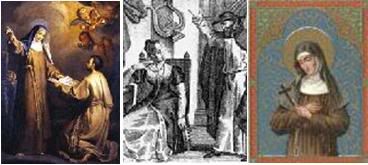 ST. GIACINTA (Hyacinth) MARISCOTTI (Italy, 1585-1640)
ST. GIACINTA (Hyacinth) MARISCOTTI (Italy, 1585-1640)
Virgin, Third Order Franciscan, Founder, Oblates of Mary
Daughter of a noble family in Viterbo, Clarice Mariscotti decided to join the Franciscan
Third Order for laywomen, taking the name Giacinta, after a nobleman she hoped to
marry chose her sister instead. However, she spent the next 15 years living confortably
amid colleagues who strictly observed the Franciscan rule. During a severe illness,
her confessor counselled her to change her ways, and she did - divesting herself of
every comfort and thereafter living penitentially, doing humble work in the convent.
She later established confraternities devoted to helping the poor, the aged and
prisoners, and to promote Eucharistic adoration. She became so renowned for her
holiness that when she died, people who came to venerate her took away pieces of
her clothing so that her garments had to be replaced three times while she lay in
state. She is buried in the Poor Clares convent in Viterbo and was canonized in 1807.
Readings for today's Mass: www.usccb.org/nab/readings/013011.shtml
OR today.
 The main story is the popular uprising in Egypt against President Hosni Mubarak - it has not abated although Mubarak has appointed a widely respected military figure, Omar Suleiman, as his vice-president. Other Page 1 stories: Against the background of these anti-gvernment uprisings in Algeria (where it began), Tunisia and now Egypt, the African Union is holding its annual summit in Addis Ababa Jan. 30-31; in Afghanistan, a provincial vice-governor is killed by a terrorist bomb; at the Davos World Economic Forum, UK Prime Minister David Cameron joins German Chancellor Angela Merkel in saying Europe's primary fiscal responsibility is to bring down public debt. Papal stories in this issue are the Holy Father's audience with the community of the Pontifical Ethiopian College in Rome (photo), and his videomessage to the Pontifical University of Santo Tomas in Manila, which is celebrating the 400th anniversary of its founding.
PAPAL EVENTS TODAY
The main story is the popular uprising in Egypt against President Hosni Mubarak - it has not abated although Mubarak has appointed a widely respected military figure, Omar Suleiman, as his vice-president. Other Page 1 stories: Against the background of these anti-gvernment uprisings in Algeria (where it began), Tunisia and now Egypt, the African Union is holding its annual summit in Addis Ababa Jan. 30-31; in Afghanistan, a provincial vice-governor is killed by a terrorist bomb; at the Davos World Economic Forum, UK Prime Minister David Cameron joins German Chancellor Angela Merkel in saying Europe's primary fiscal responsibility is to bring down public debt. Papal stories in this issue are the Holy Father's audience with the community of the Pontifical Ethiopian College in Rome (photo), and his videomessage to the Pontifical University of Santo Tomas in Manila, which is celebrating the 400th anniversary of its founding.
PAPAL EVENTS TODAY
Sunday Angelus - The Holy Father reflected on the Beatitudes from today's Gospel. After the prayers,
he reminded the faithful that today is both the World Day for Lepers, as well as the World Day of
Intercession for Peace in the Middle East. He welcomed the Children's Catholic Action of Rome in their
annual Caravan for Peace, and helped two children release the 'doves of peace'. He also greeted the
peoples of the world who celebrate the lunar New Year this week.
 - If you had any doubts about Turkey's ultimate intentions, look at these recent unabashedly blunt statements from a very high-ranking official:
Turkish Vice-PM says
- If you had any doubts about Turkey's ultimate intentions, look at these recent unabashedly blunt statements from a very high-ranking official:
Turkish Vice-PM says
'Europe too Christian'
Translated from

Jan. 28, 2011
It may sound like a joke in poor taste at a time of massive Islamic immigration into Europe and increasing Christianophobia, but at the World Economic Forum held in Davos, Switzerland, last week, the Turkish Deputy Prime Minister Ali Babacan told the President of the European Council Herman Van Rompuy that "Europe is too Christian - the European Union is a club for Christians that is closed in on itself and not open to enlargemmnt".
Babacan said one of the reasons for the 'hostility' to Turkey's entry into the EU was precisely the 'Christian predominance in Europe'. [That is, of course, blatantly false. Turkey's entry has been hindered because all these years, it has failed to meet the EU's requirements for observance of human rights including religious freedom.]
[Modificato da TERESA BENEDETTA 31/01/2011 02:04] |
| |
 30/01/2011 22:01 30/01/2011 22:01 |
|
| | | OFFLINE | | Post: 22.034
Post: 4.662 | Registrato il: 28/08/2005
Registrato il: 20/01/2009 | Administratore | Utente Master | |
|

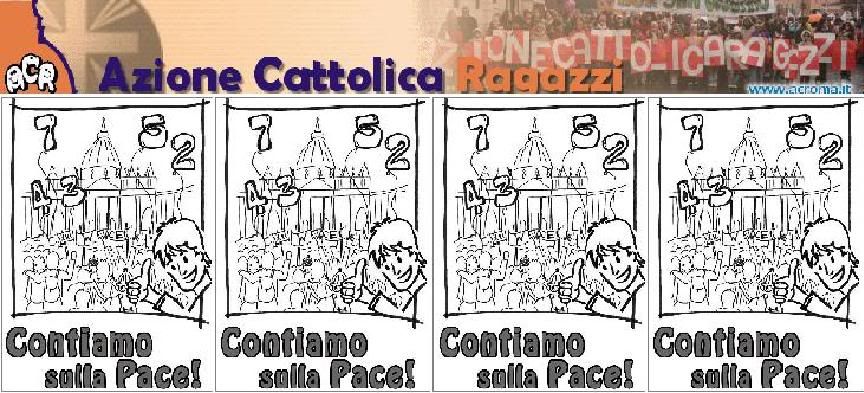 ANGELUS TODAY:
ANGELUS TODAY:
The Beatitudes, the doves of peace,
a prayer for the Holy Land,
solidarity with lepers -
and a happy Lunar New Year!

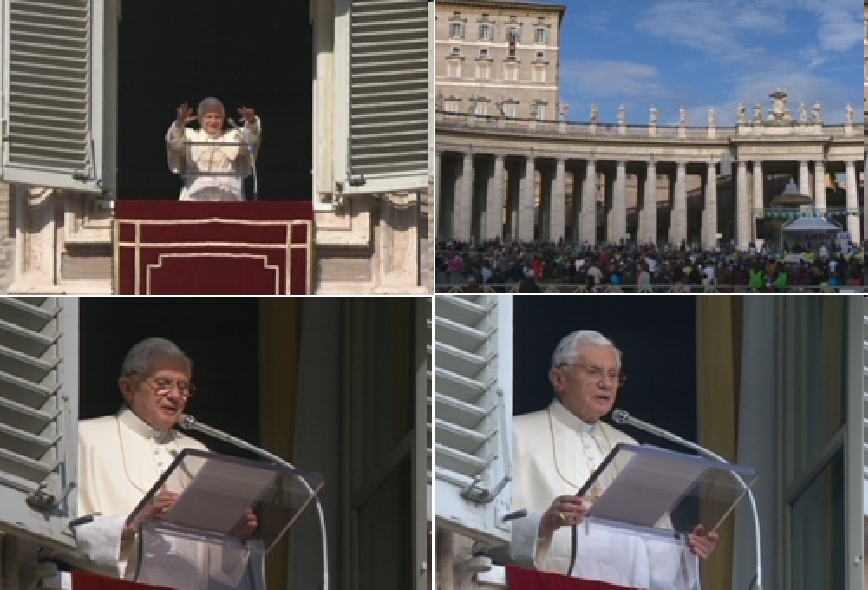
30 JAN 2011 (RV) - Pope Benedict XVI joined the International Day of Intercession for Peace in the Middle East Sunday, with a prayer to God to converge hearts and minds towards concrete solutions for peace in the Holy Land.
Following the midday Marian prayer he was joined at the window of his private study above St Peter’s Square by a boy and girl from Rome’s Azione Cattolica Ragazzi (Children's Catholic Action). The theme for this year's event is 'CONTIAMO SULLA PACE!' - We count on peace.
There in an what has become an annual tradition marking the end of the youth group's annual “Caravan of Peace”, the Pope released two white doves above the crowds.
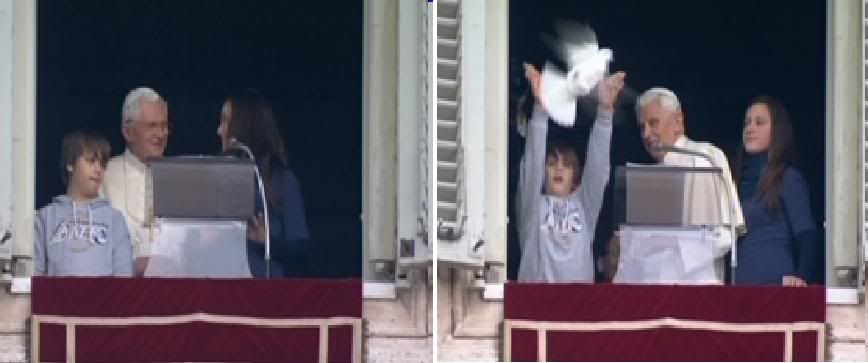
He also noted that today is the World Day for Leprosy Sufferers, promoted in the 1950s by Raoul Follereau and officially recognized by the United Nations.
"Although declining", he said, "leprosy still unfortunately affects many people who live in conditions of severe poverty. I assure all those who suffer of my special prayer, which I also extend to those who assist them and, in many ways, are committed to defeating Hansen's disease".
And looking ahead to this week’s celebration of the Lunar New Year, Pope Benedict sent a special greeting of “serenity and prosperity” to the people of the Far East.
Earlier, during his reflections on the Sunday Gospel, which this week proposes the Sermon on the Mount, the Holy Father spoke of the Beatitudes as a program of life that seeks to liberate mankind from the false values of this world.
He said "the Church does not fear poverty, contempt, persecution in a society often attracted to material wealth and worldly power," because "as St. Paul writes, God chose the weak of the world to shame the strong, and God chose the lowly and despised of the world, those who count for nothing, to reduce to nothing those who are something" (1 Cor 1:27-28).
The Beatitudes, he concluded,“are the transposition of the cross and resurrection in the existence of the disciples. They reflect the life of the Son of God who allows himself to be persecuted, despised to the point of death for the salvation of mankind”.
Here is a translation of the Holy Father's words today:
Dear brothers and sisters:
On this fourth Sunday in Ordinary Time, the Gospel presents the first great discourse by the Lord to the people, from the gentle hills along the Lake of Galilee.
"When he saw the crowds, he went up the mountain, and after he had sat down, his disciples came to him. He began to teach them..." (Mt 5,1-2)
Jesus, the new Moses, "sits on the cathedra of the mountain" (Gesu di Nazareth, Milano 2007, p 88) and proclaims 'blessed' the poor in spirit, the afflicted, the merciful, those who hunger for justice, the pure of heart, the persecuted (cfr Mt 5,3-10).
It was not a new ideology, but a teaching that came from on high about the human condition, that which the Lord through his Incarnation, wished to assume in order to save mankind.
That is why the Sermon on the Mount is addressed to the whole world, in the present and in the future - and can be understood and lived only by following Jesus, in walking with him (Gesu di Nazaret, p 92).
The Beatitudes are a new program for life, to liberate oneself from the false values of the world and open up to all that is truly good, present and future.
Indeed, when God comforts us, when he satisfies the hunger for justice, wipes the tears of the afflicted, it means that beyond rewarding each one sensibly, he opens the Kingdom of Heaven.
"The Beatitudes are the transposition of the Cross and the Resurrection into the existence of the disciples" (ibid., p 97). They mirror the life of the Son of God who allows himself to be persecuted, despised to the point of being condemned to death, so that men may be granted salvation.
An ancient hermit stated: "The Beatitudes are gifts of God, and we must give him great thanks for them and for the rewards that derive from them, namely, the Kingdom of Heaven in future centuries, comfort here and now, the fullness of every grace and mercy from God - once one has become the image of Christ on earth" (Pietro di Damasco, Filocalia, vol. 3, Torino 1985, p. 79).
The commentary on the Gospel of the Beatitudes is the history of the Church herself, the history of Christian sanctity, because, as St. Paul writes, "God chose the foolish of the world to shame the wise, and God chose the weak of the world to shame the strong, and God chose the lowly and despised of the world, those who count for nothing, to reduce to nothing those who are something" (1 Cor 1,27-28).
That is why the Church does not fear poverty, contempt, or persecution, in a society that is often attracted by material well-being and by worldly power. St. Augustine reminds us that "it does not help to suffer these bad things, but they must be borne in the name of Jesus, not only with a serene spirit, but even with joy" (De sermone Domini in monte, I, 5,13: CCL 35, 13).
Dear brothers and sisters, let us invoke the Virgin Mary, the Blessed One par excellence, asking for the strength to seek the Lord (cfr Soph 2,3) and to follow him always with joy along the way of the Beatitudes.
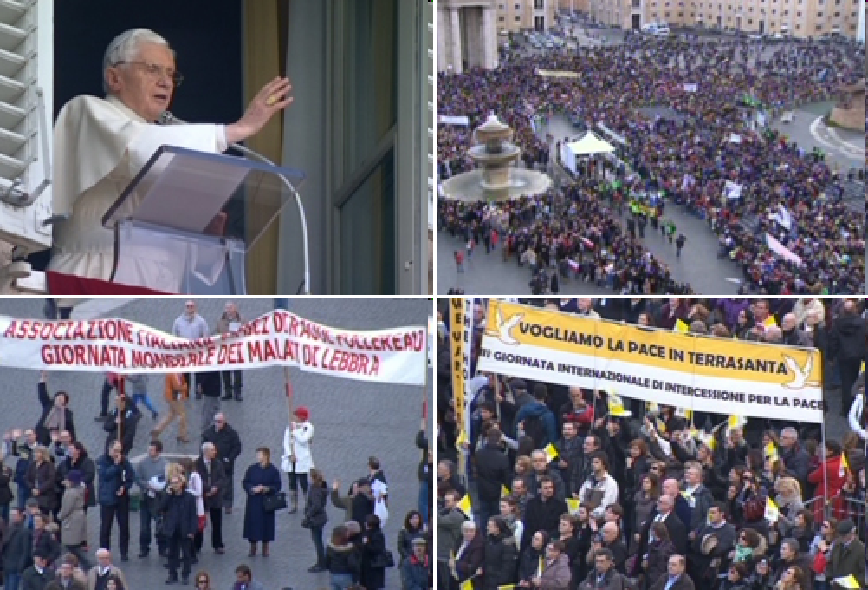
After the prayers, he said this:
On this Sunday we observe the World Day for Leprosy Sufferers, which was promoted in the 1950s by Raoul Follereau and officially recognized by the United Nations.
Leprosy, although in decline, unfortunately still afflicts many persons today, especially those who are in extreme poverty. I assure all who are afflicted of my special prayers, which i extend to those who assist them and those who, in various ways, are committed to vanquishing Hansen's disease. I especially greet the Associazione Italiana Amici di Raoul Follereau (Italian Association of the Friends of Raoul Follerreau) which marks 50 years of activity.
In the coming days, many countries in the Far East will celebrate with joy, especially in the intimacy of the family, the Lunar New Year. I extend to all of them my heartfelt wishes for peace and prosperity,
Today is also the International Day of Intercession for Peace in the Holy Land. I join the Latin Patriarch of Jerusalem and the Custodian of the Holy Land in asking everyone to pray to the Lord so he may make hearts and minds converge towards concrete plans for peace.
And I am happy to address a warm greeting to the boys and girls of Catholic Action in the Diocese of Rome, under Cardinal Vicar Agostino Vallini.
Dear children, this year, once again, you have come here in great numbers at the end of your Caravan for Peace, under the slogan, "CONTIAMO SULLA PACE' (We are counting on peace). Let us listen to the message of your two friends beside me, who will read it to us.
[The children read the message, after which they assist the Pope in releasing two doves symbolizing peace.]
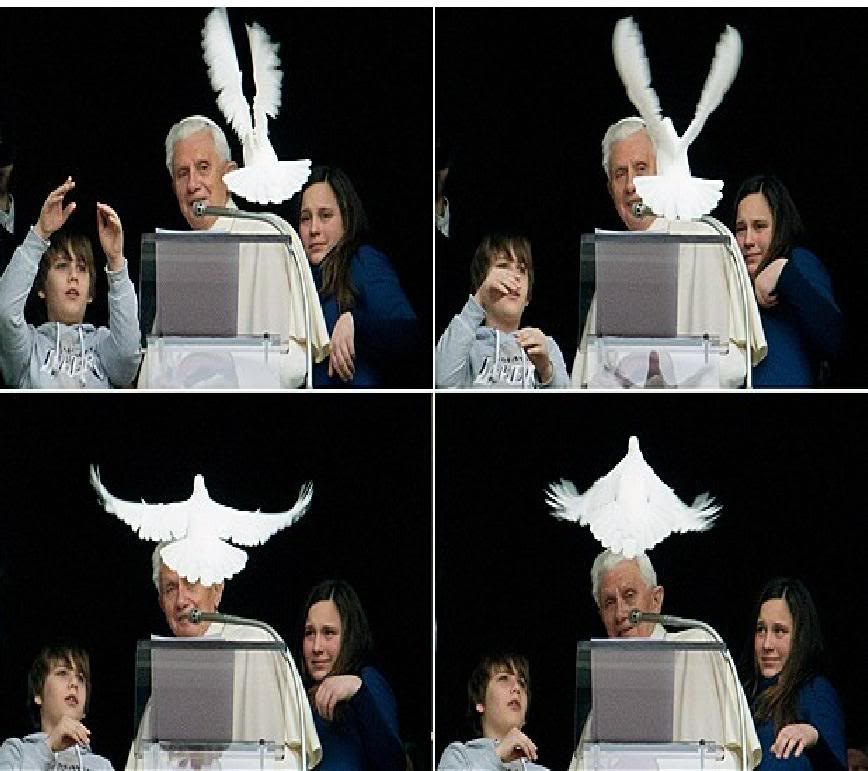
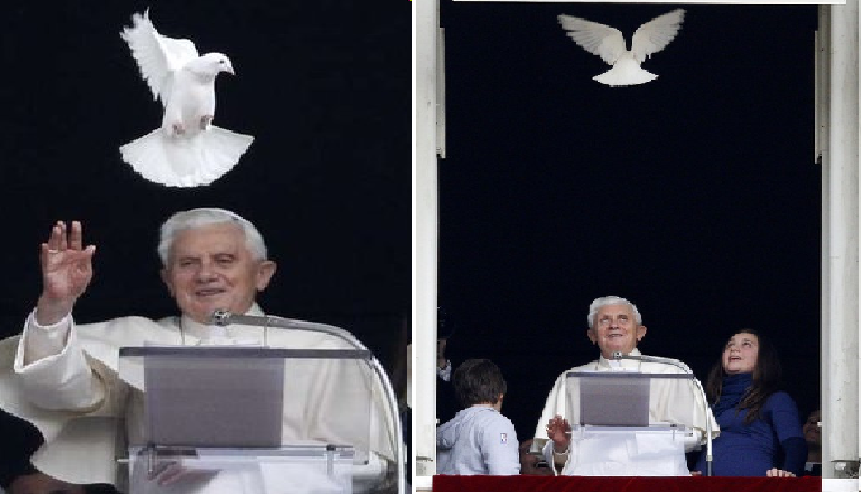 Dove malfunction!
Dove malfunction!
VATICAN CITY, Jan. 30 (AFP) - Two doves of peace released by Pope Benedict XVI during the weekly Angelus prayer on Sunday refused to leave the Vatican and flew straight back in through the open window, an AFP photographer said.
Officials only managed to catch and re-release one of the birds.
The pope was accompanied at the window of his studio in St. Peter's square by two children from the Catholic Action of Rome who had celebrated a "Month for Peace" in January.
The amused pair joined the effort to recapture the doves.
During the Angelus, Benedict marked the International Day of Intercession for Peace in the Holy Land, calling for "concrete plans for peace," and wished serenity and prosperity for those about to celebrate the Lunar New Year in the Far East.
The Pope made no reference to the ongoing tensions in Egypt. [The situation does not call for him to say anything about it for now. There are reports of dozens killed, for instance, but none of the protestors seen on TV appear to be protesting anyone killed so far, only asking for President Mubarak to resign now.]
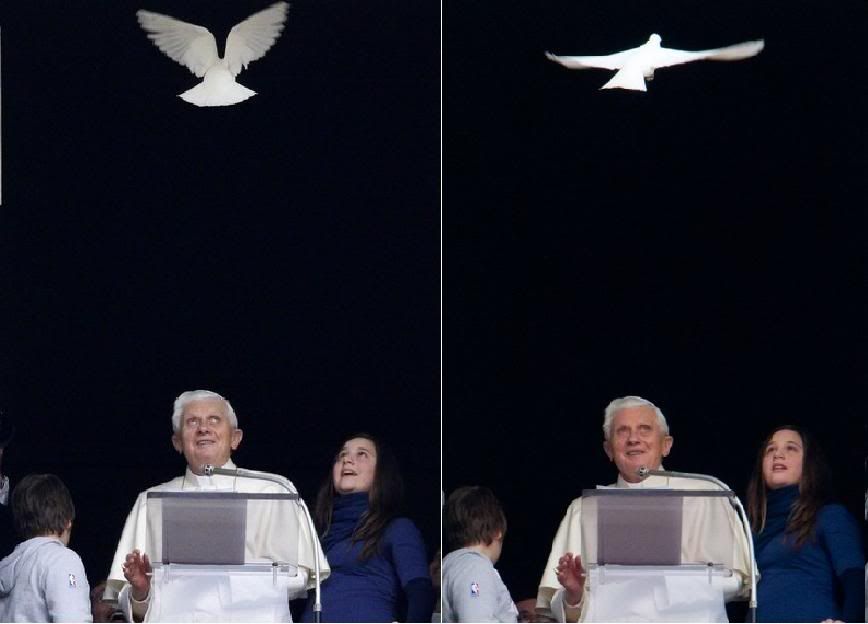
 As picture-perfect as the dove looked hovering above the Vicar of Christ, it ended up preferring to join a painted dove on the molding of the Pope's study.
As picture-perfect as the dove looked hovering above the Vicar of Christ, it ended up preferring to join a painted dove on the molding of the Pope's study.
[Modificato da TERESA BENEDETTA 31/01/2011 10:58] |
| |
 31/01/2011 11:04 31/01/2011 11:04 |
|
| | | OFFLINE | | Post: 22.036
Post: 4.664 | Registrato il: 28/08/2005
Registrato il: 20/01/2009 | Administratore | Utente Master | |
|
 Monday, January 31, Fourth Week in Ordinary Time
Monday, January 31, Fourth Week in Ordinary Time
 ST. GIOVANNI (John) BOSCO, (Italy, 1850-1888) - Priest, Founder of the Society of St. Francis de Sales, 'Father and Teacher of Youth'
ST. GIOVANNI (John) BOSCO, (Italy, 1850-1888) - Priest, Founder of the Society of St. Francis de Sales, 'Father and Teacher of Youth'
Familiarly known around the world as Don Bosco, which is how he was best known in life ('Don' is the Italian honorific for a Catholic priest), his first assignment
as a priest was as chaplain of a girls' boarding school in Turin, when he first started tending to poor children on the side through an 'oratory' he named for St.
Francis de Sales and which did not find a fixed home until much later. His first co-worker was his mother, who became known to everyone as Mamma Margherita
[and who was declared Venerable in November 2006], who spent the last 10 years of her life helping him care for his wards. In 1846, they started taking in orphans.
Don Bosco's philosophy was to educate young boys with 'reason, religion and kindness', not forgetting music and sport, as well as practical vocational training -
all this continue to be the distinguishing marks of Salesian schools all over the world. By 1859, Don Bosco's work had attracted the attention of Pope Pius IX who
supported him when he decided to establish his Salesian order of priests and lay brothers, now better known as the Salesians of Don Bosco (SDB). Eventually,
an order of Salesian sisters was also established. In life, Don Bosco already had a reputation for holiness and working miracles. Shortly after his death, there was
a popular movement to make him a saint. But the hearings for his cause brought out all his adversaries in the Church hierarchy who thought he was a loose cannon
and wheeler-dealer. Pius XI, who had known him personally, pushed his cause in the 1920s, beatifying him in 1929 and canonizing him in 1934 with the title 'Father
and Teacher of Youth'. He is buried at the Basilica of Mary Help of Christians in Turin.
Readings for today's Mass: www.usccb.org/nab/readings/013111.shtml
No OR today.
PAPAL EVENTS TODAY
The Holy Father met today with
- Cardinal Marc Ouellet, P.S.S., Prefect of the Congregation for Bishops (weekly meeting)
- Mons. Javier Echevarría Rodríguez, Superior of the Opus Dei Personal Prelature
[Modificato da TERESA BENEDETTA 31/01/2011 12:58] |
| |
 31/01/2011 16:26 31/01/2011 16:26 |
|
| | | OFFLINE | | Post: 22.037
Post: 4.665 | Registrato il: 28/08/2005
Registrato il: 20/01/2009 | Administratore | Utente Master | |
|

 Events in Egypt overtook this news report which would - and should - otherwise have commanded great attention. Fr. Samir reported on it just as the first street uprisings were getting under way in Egypt, and of course, it was quickly buried by the onslaught of 'topical news', just as I had been meaning to post it since Friday, but somehow, it kept being sidelined....Also, I was originally going to post this in ISSUES, but in many ways, it is one of those unexpected 'fruits of Regensburg'...
Events in Egypt overtook this news report which would - and should - otherwise have commanded great attention. Fr. Samir reported on it just as the first street uprisings were getting under way in Egypt, and of course, it was quickly buried by the onslaught of 'topical news', just as I had been meaning to post it since Friday, but somehow, it kept being sidelined....Also, I was originally going to post this in ISSUES, but in many ways, it is one of those unexpected 'fruits of Regensburg'...
Egyptian imams and intellectuals:
Renewing Islam towards modernity
The program - truly revolutionary - wants to rethink
the value of women, fraternisation between the sexes,
the relationship of equality with Christians, and
to clarify interpretations on the sayings of Mohammed
and the myths of fundamentalist Salafism, rejecting
the influences that come from Saudi Arabia.
by Samir Khalil Samir, SJ

ROME, Jan. 26 (AsiaNews) - Rethinking fraternisation between the sexes; opening the doors to women right up to the Presidency of the Republic, guaranteeing the right of Christians to have access to positions of prestige (even the presidency); purifying and reinterpreting the sayings of the Prophet (the Hadith); bringing people to God through wisdom and thanksgiving and not with the threats ... these are just some of the truly revolutionary proposals that a group of professors, theologians and Egyptian imams are putting to their communities.
The attempt to modernize the lives of Muslims, to put a halt to (and even stop) the fundamentalist influences that come from Saudi Arabia. The group of scholars holds the renewal of Islamic teaching at heart, as well as a relationship of harmony with Christians.
A score of intellectuals and theologians of Al Azhar have issued a text of enormous importance, entitled "Document for the renewal of religious discourse." The text was "posted" on the Internet on 24 January at 18:27, on the website of the weekly magazine Yawm al-Sâbi(The Seventh Day). The importance of the document also derives from its signatories, all noted scholars and profoundly committed Muslims.
Among these it is worth mentioning: Dr. Nasr Farid Wasel, former Grand Mufti of Egypt, the imam Safwat Hegazi, Dr. Gamal al-Banna, brother of the founder of the Muslim Brotherhood, the professors Malakah Zirâr and Âminah Noseir the celebrated Islamist writer Fahmi Huweidi; Dr. Mabruk Atiyyah, a large number of preachers (du'ât), responsible for Islamic Propaganda, such as Khalid al-Gindi, Muhammad Hedâyah, Mustafa Husni, etc..
It is the first time that such an attempt has been made by recognized Islamic figures. On being posted, the document received 153 comments in the same day. The majority (88.25%) condemned the text, saying it distorts Islam or tries to establish a new religion. Only 18 people congratulated the authors. This means that the path of renewal will be long and require much time and effort.
The original text of the document (in Arabic) and comments can be found at: www.youm7.com/News.asp?NewsID=343007.
Here we publish a draft translation of the document, which will probably need to be reviewed. In the coming days we will also comment on some of the proposals.
Document for the renewal
of religious discourse
1. Review the books of the Hadith (the words attributed to Muhammad) and Koranic commentaries to purge them.
2. Fine-tune Islamic political-religious vocabulary, such as the gizyah (the special tax required of dhimmi, the second-class citizens).
3. Find a new expression for the concept of fraternisation between the sexes.
4. Develop the Islamic vision of women and find suitable ways for marriage laws.
5. Show Islam is a religion of creativity.
6. Explain the Islamic concept of gihâd, and clarify rules and requirements that govern it.
7. Block attacks on external piety and foreign practices that come from neighbouring states [a euphemism that aims to expose the influence of Saudi Arabia]
8. Separate state and religion.
9. Purify the heritage of the "first centuries of Islam (Salafism), discarding the myths and attacks against religion.
10. Give adequate preparation to missionary preachers (du'ât) and in this field open the doors to those who have not studied at the University of Al Azhar, according to clear criteria.
11. Formulate the virtues common to the three revealed religions.
12. Eliminate incorrect practices and provide guidance with regard to Western ways.
13. Articulate the relationship that should exist between members of religions through schools, mosques and churches.
14. Redraw in a different way [adapted] to the West the presentation of the biography of the Prophet.
15. Do not keep people away from economic systems with the requirement not to deal with banks.
16. Recognising the right of women to the Presidency of the Republic.
17. Combat sectarian claims, [underling] that the flag of Islam [must be] one. Invite people to come to God through gratitude and wisdom, not through threats.
18. Evolve the teaching of Al Azhar.
19. Recognise the right of Christians [to have access] to important positions and [also] to the presidency.
20. Separate religious discourse from power and restore the bond with the needs of society
21. Establish the bond between the Da’wah (the call to conversion to Islam) and modern technology, satellite chains and the market for Islamic cassettes.
This document was more surprising in view of the totally unfounded polemical attitude suddenly taken by the Grand Imam of Al Azhar - Sunni Islam's highest authority - towards the Pope and the Catholic Church, an attitude that is certainly at odds with the sentiments of the document. Anyway, this report has been out there long enough for Sandro Magister to pass it on and comment on it today, although I am not sure one would characterize this development the way Magister does in his title. If anything, this would tend to be buried under and left inactive for some time depending on how the uprising of the Arab street against their own leaders ends up. It's the first time the Arab street - or the 'Muslim street', for that matter - has ever turned entirely against its own rather than against 'foreign devils' since the Shah was overthrown in Iran
A glimmer of light in
an Egypt in revolt
An appeal by 23 Muslim figures for an Islam that is more authentic and respectful of the rights of all.
On the path of the illuminist revolution proposed by Benedict XVI.
An analysis by the Jesuit Islamic scholar Samir

ROME, January 31, 2011 – Mubarak's Egypt was a mainstay of Western politics in the Middle East. It was also a mainstay for the dialogue between the Church of Rome and Shiite Islam, with its epicenter the mosque and university of al-Azhar. [Not Shiite, SUNNI!]
Egypt was considered a bulwark against radical Islam and protection for local Christians, although at the price of their oppressive subjection, under a regime of perpetual "dhimmitude."
Today, all this risks being overturned by an upheaval whose beneficiaries will inevitably be the Muslim Brotherhood and the radical Islamic currents.
The New Year's Eve massacre at the Coptic church in Alexandria is the tragic corollary of a "fitna," of a fracture inside the Muslim world in Egypt and in other countries, against regimes and leaders held to be apostates, against a Christian presence held to be polluting, to be swept away.
Even the accusations of "interference" unexpectedly hurled against Benedict XVI at the beginning of this year by the grand imam of al-Azhar, Ahmed al-Tayyeb, and his subsequent abandonment of dialogue with the Church of Rome are part of this fracture, which has exploded in the revolts of recent days.
The Imam of al-Azhar is tied with a double thread to Mubarak's illiberal regime, with which he shares the same description of "moderate" against the background of international equilibrium.
To keep the brakes on mass Muslim revolts, both of the Egyptian authorities – political and religious – have always repressed on the one hand the freedom of the Coptic Christians, and on the other, the range of activity of the radical Islamic currents.
Most recently, the increased fear of a collapse of the regime has induced both Mubarak and al-Azhar to crack down even harder. In fact, even before the massacre in Alexandria, Imam al-Tayyeb – who is also one of the signers of the famous "letter of the 138 Muslim scholars" to the Pope – had opened the hostilities against the Church of Rome.
He demanded and obtained the retraction of one of the Vatican's key delegates – Fr. Khaled Akasheh, Jordanian, an expert on Islam and member of the Pontifical Council for Inter-Religious Dialogue – from talks previously scheduled in Cairo but now suspended indefinitely.
Until recently, moreover, both Mubarak and al-Azhar had also systematically reduced to silence all of the pro-reform voices in the Muslim camp that have distanced themselves from the traditionalist currents. The list of "heretics" who have been killed, wounded, put on trial, imprisoned, silenced, exiled, is startling. It includes a Nobel laureate in literature, the great Naguib Mahfuz.
It is no surprise, therefore, that in these days of general revolt, some of these reformist voices have come out into the open.
Among the other collective actors present in Egypt, the Copts have held back from taking to the streets (a protest march broke out among them only after the massacre in Alexandria). They are afraid that the collapse of the Mubarak regime would make their lives even more difficult.
The Muslim Brotherhood has also stayed on the sidelines, but for different reasons. They are calculating that either way, the collapse of the regime would be to their advantage.
For the reformist Muslims, however, an opening has been made. And they have made their voices heard. [On the religious front, yes, but their voices may have no weight on the developing political front, since all the Egyptian religious authorities, as in other Muslim countries, are appointed by the government.
On January 14, on the website of the Egyptian magazine Yawm al-Sâbi (The Seventh Day), a text appeared entitled "Document for the renewal of religious discourse." By that night, the text had already been posted on more than 12,000 other Arab websites.
Its importance was pointed out beyond the Arab world by a Jesuit and Islamologist, Samir Khalil Samir, Egyptian by birth, greatly respected by Benedict XVI.
He has translated and commented on the essential parts of the document in two articles published by the online agency "Asia News" of the Pontifical Institute for Foreign Missions.
[Magister then reproduces Samir's translation of the document posted in Samir's article above.]
These 22 points are followed by Fr. Samir's commentary on teh most important points.
www.asianews.it/news-en/Egyptian-revolt-not-only-political-but-also-spiritual-and-Islamic-20...
Which, in Fr. Samir's judgment, give a glimpse of a real and proper revolution with respect to the traditionalist and puritanical ways of living Islam recently introduced into Egypt, above all by Saudi Arabia.
For instance, Point 8, the proposal to separate religion from politics. In his commentary, he points out that the word "almaniyyah" (secularism) is used - a word that in Arab countries is usually understood as atheism, and therefore automatically condemned. So much so that at the synod on the Middle East held in Rome last October, the bishops avoided using it.
Here, however, the authors of the document write that secularism must not be considered an enemy of religion, but rather as a safeguard against the political or commercial use of religion.
"In this context," they write, "secularism is in harmony with Islam, and therefore is juridically acceptable." But not if it is turned into a control of Islamic activities on the part of the state.
Fr. Samir comments: "This point, although it is greatly debated, demonstrates the fact that in Egypt the concept of civil society is emerging, not immediately in agreement with the Islamic community."
Also noteworthy is point 6 on jihad, or holy war. The authors of the document admit it can be waged only if it is defensive, and only in Muslim territory. But they say it can never apply to the killing of unarmed persons, women, the elderly, children, priests, monks. Never with attacks on places of prayer. They emphasize that this has been the teaching of Islam for 1400 years, and that those who violate it seriously betray it. [[But why has it taken them all this time to say this - when they should be affirming it everytime an Islamist terrorist kills someone anywhere!]
The signal given by this document is a small one. But it must not be overlooked. When these issues were discussed previously - a number of times – in talks between representatives of the Catholic Church and of Islam, they were never picked up and reported to the Muslim public.
The "letter of the 138" itself is still unknown to most of the Muslims in the world.
This document from Cairo, on the other hand, immediately spread to a wider circuit of opinion. It is getting a lot of comments on the various websites, most of them in disagreement and hostile, but still proof of interest in discussing the issue.
If one looks at what Benedict XVI has said – in the same year as the lecture in Regensburg and the voyage to Turkey – about the future of Islam, this document from Cairo marks a small step in the very direction hoped for by the pope.
Benedict XVI said to the Roman curia on December 22, 2006:
The Muslim world today finds itself facing an extremely urgent task that is very similar to the one that was imposed upon Christians beginning in the age of the Enlightenment, and that Vatican Council II, through long and painstaking effort, resolved concretely for the Catholic Church. [...]
On the one hand, we must oppose a dictatorship of positivist reasoning that excludes God from the life of the community and from the public order, thus depriving man of his specific criteria of judgment.
On the other hand, it is necessary to welcome the real achievements of Enlightenment thinking – human rights, and especially the freedom of faith and its exercise, recognizing these as elements that are also essential for the authenticity of religion.
Just as in the Christian community there has been lengthy inquiry into the right attitude of faith toward these convictions – an inquiry that certainly will never be concluded definitively – so also the Islamic world, with its own tradition, stands before the great task of finding the appropriate solutions in this regard.
[Modificato da TERESA BENEDETTA 31/01/2011 18:49] |
| |
 31/01/2011 18:10 31/01/2011 18:10 |
|
| | | OFFLINE | | Post: 22.038
Post: 4.666 | Registrato il: 28/08/2005
Registrato il: 20/01/2009 | Administratore | Utente Master | |
|
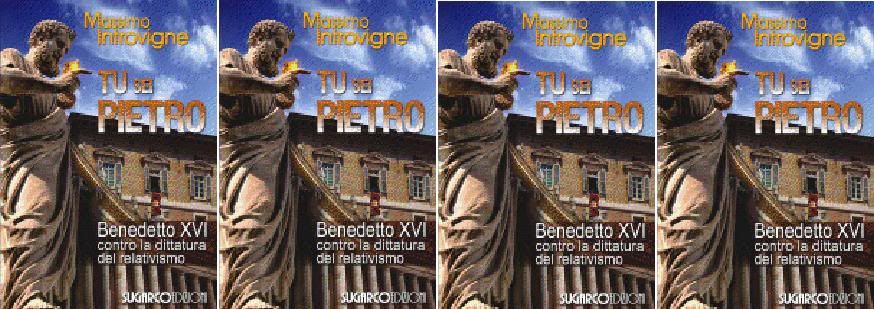 Benedict XVI and the battle for truth:
Benedict XVI and the battle for truth:
Massimo Introvigne on the Pope's Magisterium
by Antonio Gaspari
Translated from the Italian service of

ROME, Jan. 31 (ZENIT.org).- Benedict XVI is not only one of the greatest living intellectuals but also one of the world's most widely-read authors.
And yet, even among Christians, his texts are rarely read in their entirety and hardly ever studied appropriately. Often, his Magisterium is relativized [and misrepresented or distorted], contested, and mostly not known,
In order to make his points about Benedict XVI's Magisterium, sociologist and religious historian Massimo Introvigne has just published the book Tu sei Pietro. Benedetto XVI contro la dittatura del relativismo(TU ES PETRUS: Benedict XVI against the dictatorship of relativism)(Sugarco, Milano 2011).
In 320 pp., Introvigne comments on the Pope's Magisterium, from the encyclical Spe salvi in 2007 to the Apostolic Letter
Ubicumque et semper of 2010 which institutes the Pontifical Council for Promoting New Evangelization.
He illustrates through the Pope's own texts how the Pontiff is carrying on an offensive against the dictatorship of relativism in order to broaden the horizons of reason, re-anchor faith to the hearts of the faithful, and make room for the proclamation of truth.
"From Africa to France to Great Britain, from his own diocese of Rome to the White House, and his encounters with young people in the World Youth days," Introvigne writes, "Benedict XVI emerges as the primary custodian not only of the faith but also of reason threatened by relativism. Because of this, many attack him. Because of this, it is the duty of the Catholic faithful to rally around him closely, and repeating to him the words of Jesus, 'You are Peter, the rock on which I will build my Church'."
Inrovigne has written 60 books and hundreds of articles published in international academic journals on the new religions, contemporary religious pluralism and the papal Magisterium.
He is the founder and director of CESNUR (Centro degli Studi sulle Nuove Religioni) and a member of the Italian Interior Ministry's Commission for Islam in Italy. Recently, he was named a representative to the committee of the European Organization for Security and Cooperation to fight intolerance and anti-Christian discrimination.
Why did you decide to write this book?
I am a deputy national officer of the Alleanza Cattolica, an association whose specific calling is to study and disseminate the social teaching of the Church.
The Magisterium has been much discussed, distinguishing between infallible and non-infallible, dogmatic and pastoral, ordinary and extraordinary - and every blogger fancies himself a theologian, but Benedict XVI said the truth in his recent book-length interview: Many speak about the Magisterium without having read it.
For instance, the Pope's views on Vatican II are constantly being questioned - when he has written and spoken about it so many times. If we rule out bad faith among those who pose such questions, one can only conclude they have not read the pertinent texts.
You rightly point out the problem of how the Magisterium is 'received' by the clergy and by the faithful. Setting aside the mass media and many so-called intellectuals who criticize the Pope, it is a fact that the majority of Catholics have never read what the Pope says or writes. Not even the texts of his weekly catecheses and Angelus messages. In general, many laymen and even most priests make do with what the mass media report about what the Pope has said. How do you address this problem in your book?
That the problem concerns the 'normal' functioning of the Church itself, and that perhaps the solution lies with the lay faithful since too many priests are occupied with doing other things.
Another problem is that not all priests cite the Pope's words in their homilies or catecheses. Is this simple ignorance about what the Pope says and writes, or a failure to understand it, or simply that they have never really paid attention to the 'ordinary' Magisterium?
I see three related problems. First, there is a 'progressivist' minority of priests who consciously and deliberately reject Benedict XVI whom they consider 'too conservative'.
There is another minority that the Pope calls 'anti-conciliar', who in their obsession to reject Vatican II as not being infallible, also consider the Pope's daily non-infallible Magisterium as irrelevant, forgetting that the faithful must follow the entire Church Magisterium, not only its infallible dogmas.
And there is a whole sea of people, perhaps the overwhelming majority, who simply are not aware of the Magisterium because their daily routine does not give them the occasion or the time to do so.
And yet, this Pope is one of the most widely-read authors in the world. His books, for all their specifically Catholic content, are translated and sold around the world. He is considered highly credible and held in great esteem by religious and laymen of other faiths, and among atheist or pagan thinkers. How do you explain this phenomenon?
As I like to point out, the passionate followers of Benedict XVI whom I meet are much more often laymen than clergy. And it is true that among these passionate readers of his are many non-Catholics and non-believers. He is one of the great thinkers of our day, and so, even non-believers find it their duty - and often a pleasure, I believe - to encounter his mind in these books.
You point out that one problem is also the partial and often 'time-limited' or topical reading of pontifical teaching. But you say that on the contrary, each text must be read in the light of the present Pope's previous interventions and of what other Popes have said about the same subject. That each new teaching is a standard or criterion for reading the next text or intervention. Can you illustrate this with an example?
I do not have a personal point of view on this topic, but I can point out what this Pope himself has illustrated so many times. Let us take the example of Caritas in veritate. Benedict cites Paul VI's Populorum progressio and explains that in order not to reduce it to a mere 'collection of sociological data' which perhaps are no longer of interest to anyone today, that encyclical must be read in the light of all the social Magisterium that preceded it and which explains and clarifies it. This is what the Church calls 'living Tradition' and this spirit must be applied to every document of the Magisterium.
Some have accused Benedict XVI as having ruined the ecumenical dialog because he is too rigorous in announcing the Catholic faith. when actually, with the Anglicans, the Lutherans and the Orthodox, relations today have never been better. How do you explain this?
In the recent Week of Prayer for Christian Unity, the Pope reaffirmed two truths about ecumenism. The first is that, especially among the Protestants, it is undergoing a season of crisis which has nothing to do with theological or spiritual reasons, but because some large Protestant communities have yielded to the spirit of the times on matters like abortion and same-sex marriage. Which other Christians cannot ignore for the sake of 'ecumenical coexistence', but it must be constantly stressed to the secularized why these practices are wrong, arguing from reason and not just from faith.
The second fact is that despite some serious difficulties, the Second Vatican Council's decision for ecumenism is irreversible and obligatory, and part of the nucleus of Benedict XVI's Pontificate. The Pope points out that the Church believes in the effort, even if it often seems difficult and even impossible, because the Lord himself wants it so.
Non-Catholic Christians understand this ecumenical position of the Pope - a position that is most heroic and certainly cause for suffering - more than many Catholics who may say 'Long live the Pope!' but ignore or fail to appreciate this essential dimension of his Pontificate.
|
| |
|
|
|
|